Allison M. Dickson's Blog, page 2
November 19, 2015
Some News About THE LAST SUPPER, or The Importance of Recognizing Failure And Moving On
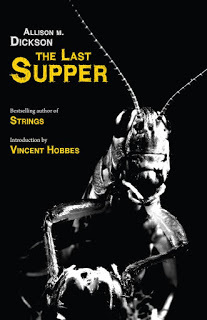
2008-2015
Gone but not forgotten
Well, THE LAST SUPPER is officially off the market. Rights have reverted back to me. I have all the files, and I am free to do with them what I wish. After about a year of my publisher doing everything known to man to get this book up off the ground, we came to the conclusion that it was DOA. Being the great people they are, Hobbes End offered to return the rights to me, because they felt like they weren't doing right by me with this title. Due to the misgivings I've always had about this book (I'll get to that in a sec) as well as always being happy to have the rights back to my work, I decided to take them up on that offer.
I am not sure what my next move with TLS will be just yet, though. I could turn right back around and upload it under my own name/imprint. Or I could place the book back into the trunk from whence it came. Right now, my heart is in the latter place (I'm too busy with current work to revisit it right now regardless), but who's to say I won't resurrect it at some point? What good is a Last Supper without a little resurrection, anyway?
Really, though, it's okay. As sad as this probably sounds, I'm in total acceptance mode and not upset about this. As I said before, I've always had some misgivings about this book. We had numerous production delays, so by the time it finally came out, enough time had passed that I was no longer sure whether this book was representative of the kind of fiction I want to write or be known for. It used to be, but that was back when I was bold (or naive?) enough to think a woman could have a thriving career as a science fiction author, and that the gender barrier was a myth. I've learned a lot since those days and understand the landscape a lot better than I used to. But I don't entirely blame that for this book's lack of success. Dystopian is a saturated market at the moment, and people have had their fill of it. It's a harder sell, harder hard to break away from the pack and stand out as unique. The odds were just not in my favor.
Also, and most important, STRINGS kind of changed everything for me and sent me off into the direction toward the place I feel most at home as an author, and that is in dark suspense. While I still do intend to work in fantasy/sci-fi in the short form, I intend to make my bread and butter writing modern day contemporary suspense/thrillers. STRINGS showed me I had a niche for my style. TLS, being the oldest of my works, was the book that showed me I could write at all, and it opened a door to a relationship with one of the best publishers I've had the privilege of working with. It also earned me a starred review on Publishers Weekly, which was one of the greatest surprises of my career. So I will always be grateful to it that way.
We did the best we could, but sometimes things just don't work out the way you hope. Despite any setbacks one has in this crazy business (and I've had more than a few), I have learned that there are always bigger and brighter things in front of you, but only if you forge ahead, and that's what I'm choosing to do now.
By the way, do still have paperbacks remaining that I intend to sell until the supply has been fully exhausted, so the next several shows I do, expect to see copies at my table. They'll be considered collector's items now.
Thank you to all who have read and enjoyed THE LAST SUPPER. It means the world to me.
Published on November 19, 2015 11:37
October 27, 2015
On Writing the Same Book Twice
The craft of writing is one of my life's greatest loves, but 2015 has really put that love to the test more than any other since I've started down this path. Here is the story of how I completed two completely different versions of the same novel in four months.

We can rewrite it. We have the technology.
I'm not talking edits. I'm not talking revisions. I'm talking complete top-down rewrite, scrap it and start over with a blank page. You know that part in MISERY where Annie makes Paul burn his novel and then start a whole new one? It was a bit like that, only I didn't have any painkillers to numb myself afterward. And no, my agent is not Annie Wilkes in this analogy, in case you were wondering. I am my own Annie.
It all started back in March, when my agent began circulating my dark suspense book SECRET THINGS around to various publishers. While that whole craziness was going on, I had another book in the works called BLIND SPOTS. The two stories are quite different. SECRET THINGS is a neo-Gothic Southern drama about a very troubled family with all kinds of, well, secrets. It's full of bleak, twisted events and is not exactly for the faint of heart. These elements have been part of the reason why the book has not yet sold to a publisher (but we're not giving up on it yet!).
BLIND SPOTS, on the other hand, is a slightly lighter fare. It has its heavy moments, to be sure, but if we compare the two in tone, SECRET THINGS is like something Darren Aronofsky or David Fincher might make and BLIND SPOTS is more along the lines of a classic Alfred Hitchcock thriller (think Rear Window or Strangers on a Train).
I started writing this book in the summer of 2014, hit a wall with it, and didn't pick it up again until it became clear that I should maybe get a second book ready to entice editors with. So between April and June, I wrestled that beast into something resembling a complete book and delivered it to my agent, albeit with misgivings. I knew it needed work, but at that point, I needed someone to tell me what was what, and if your agent can't do that, then no one can. She got back to me a few weeks later with some notes and they echoed my worries pretty much word for word.
While the seed of the book was great, everything else...well...kind of sucked. Those weren't her words. She's far kinder and more encouraging than that, but regardless of the wording, the truth stacked up the same way. If I decided to revise this book in the way it needed in order to be salable, I was going to have to scrap the whole thing and start over, and I'd never done that before.
Initially, I didn't want to do it. Who the hell does? Revising and editing are one thing. I've ripped my books apart limb by limb and sowed them back together again good as new, but tearing down and rebuilding from scratch is a whole other process, and staring at such a Herculean task was enough to turn my bowels to water. For a couple days, I nearly considered just trunking the thing and starting something fresh.
But the idea just wouldn't let go. BLIND SPOTS has been in my head for over a year. The characters feel like real people to me, their struggles a part of my physical memory. And I wholeheartedly believed in the concept, which is a twist on the marriage thriller and is actually in its own way a wicked little love story. I wanted to get this right. Dammit, I COULD get this right.
So I spent the next couple days rethinking the characters, their motivations, their backstories, everything. I also completely retooled the plot, keeping it a bit simpler while also introducing some new characters while giving a few folks from the previous version new life and dimension. For the next two months, I told this new version of the story and built an entirely new world for this very unlikely couple at the center of it all. If you put the two books side by side and changed the character names in one version, you would think they were two different stories.
The main difference, though, is I'm SO MUCH HAPPIER with the second book, and I think (though I don't know for sure yet, because she's still reviewing it) my agent will be much happier as well. I've written enough books by now to know what being on the right track feels like. I didn't feel it much at all while I was writing BLIND SPOTS 1.0. It's why I walked away from it for several months before going back to it. I didn't have that problem at all with 2.0. Like my more successful writing efforts, it basically just fell out of my brain in one go. It will still need some tweaks and further development, of course, but it'll just be regular old editing work this time, and that will be a cakewalk compared to what I just finished.
Any writer will tell you that divorcing yourself from your ego is a big part of the process of making your books as good as they can be. Many of you right now are probably weeping at the idea of having to tear down something that represents months or maybe even years of hard work and redoing it. I'm not saying you should do this with all or any of your work. Hell, I'm not even sure I could do it again for something else of mine. BLIND SPOTS was a special case of me believing enough in a story's concept to give it the best I had in me, even if it meant total annihilation and resurrection. If you find yourself staring down a similar barrel with a book that has a solid foundation, but where every wall and floor is crooked and the roof is leaking and the wiring is shorting and you know a wrecking ball is the only real option, just know that you CAN tear down and rebuild, harvesting shiny scraps from the heap as you go. And in that process, you'll really learn what you're made of.
If the agent doesn't like this version, though, I'm moving on, Yeah, it's always good to persevere through rough patches and test your mettle, but you still gotta know when to quit, and I have other ideas waiting their turn at the page. Hopefully I'll be able to report back with good news soon!

We can rewrite it. We have the technology.
I'm not talking edits. I'm not talking revisions. I'm talking complete top-down rewrite, scrap it and start over with a blank page. You know that part in MISERY where Annie makes Paul burn his novel and then start a whole new one? It was a bit like that, only I didn't have any painkillers to numb myself afterward. And no, my agent is not Annie Wilkes in this analogy, in case you were wondering. I am my own Annie.
It all started back in March, when my agent began circulating my dark suspense book SECRET THINGS around to various publishers. While that whole craziness was going on, I had another book in the works called BLIND SPOTS. The two stories are quite different. SECRET THINGS is a neo-Gothic Southern drama about a very troubled family with all kinds of, well, secrets. It's full of bleak, twisted events and is not exactly for the faint of heart. These elements have been part of the reason why the book has not yet sold to a publisher (but we're not giving up on it yet!).
BLIND SPOTS, on the other hand, is a slightly lighter fare. It has its heavy moments, to be sure, but if we compare the two in tone, SECRET THINGS is like something Darren Aronofsky or David Fincher might make and BLIND SPOTS is more along the lines of a classic Alfred Hitchcock thriller (think Rear Window or Strangers on a Train).
I started writing this book in the summer of 2014, hit a wall with it, and didn't pick it up again until it became clear that I should maybe get a second book ready to entice editors with. So between April and June, I wrestled that beast into something resembling a complete book and delivered it to my agent, albeit with misgivings. I knew it needed work, but at that point, I needed someone to tell me what was what, and if your agent can't do that, then no one can. She got back to me a few weeks later with some notes and they echoed my worries pretty much word for word.
While the seed of the book was great, everything else...well...kind of sucked. Those weren't her words. She's far kinder and more encouraging than that, but regardless of the wording, the truth stacked up the same way. If I decided to revise this book in the way it needed in order to be salable, I was going to have to scrap the whole thing and start over, and I'd never done that before.
Initially, I didn't want to do it. Who the hell does? Revising and editing are one thing. I've ripped my books apart limb by limb and sowed them back together again good as new, but tearing down and rebuilding from scratch is a whole other process, and staring at such a Herculean task was enough to turn my bowels to water. For a couple days, I nearly considered just trunking the thing and starting something fresh.
But the idea just wouldn't let go. BLIND SPOTS has been in my head for over a year. The characters feel like real people to me, their struggles a part of my physical memory. And I wholeheartedly believed in the concept, which is a twist on the marriage thriller and is actually in its own way a wicked little love story. I wanted to get this right. Dammit, I COULD get this right.
So I spent the next couple days rethinking the characters, their motivations, their backstories, everything. I also completely retooled the plot, keeping it a bit simpler while also introducing some new characters while giving a few folks from the previous version new life and dimension. For the next two months, I told this new version of the story and built an entirely new world for this very unlikely couple at the center of it all. If you put the two books side by side and changed the character names in one version, you would think they were two different stories.
The main difference, though, is I'm SO MUCH HAPPIER with the second book, and I think (though I don't know for sure yet, because she's still reviewing it) my agent will be much happier as well. I've written enough books by now to know what being on the right track feels like. I didn't feel it much at all while I was writing BLIND SPOTS 1.0. It's why I walked away from it for several months before going back to it. I didn't have that problem at all with 2.0. Like my more successful writing efforts, it basically just fell out of my brain in one go. It will still need some tweaks and further development, of course, but it'll just be regular old editing work this time, and that will be a cakewalk compared to what I just finished.
Any writer will tell you that divorcing yourself from your ego is a big part of the process of making your books as good as they can be. Many of you right now are probably weeping at the idea of having to tear down something that represents months or maybe even years of hard work and redoing it. I'm not saying you should do this with all or any of your work. Hell, I'm not even sure I could do it again for something else of mine. BLIND SPOTS was a special case of me believing enough in a story's concept to give it the best I had in me, even if it meant total annihilation and resurrection. If you find yourself staring down a similar barrel with a book that has a solid foundation, but where every wall and floor is crooked and the roof is leaking and the wiring is shorting and you know a wrecking ball is the only real option, just know that you CAN tear down and rebuild, harvesting shiny scraps from the heap as you go. And in that process, you'll really learn what you're made of.
If the agent doesn't like this version, though, I'm moving on, Yeah, it's always good to persevere through rough patches and test your mettle, but you still gotta know when to quit, and I have other ideas waiting their turn at the page. Hopefully I'll be able to report back with good news soon!
Published on October 27, 2015 21:00
September 16, 2015
Read Chapter Two of THE OILMAN'S DAUGHTER Here!
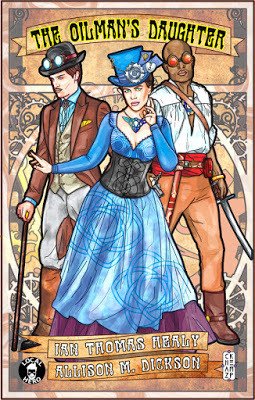
In two weeks, Ian Healy and I will be celebrating the world debut of our joint venture, THE OILMAN'S DAUGHTER , a steampunk space opera adventure that is completely unlike anything you've seen from either of us. Especially me, if you know the freakish kind of stuff I write.
If you're here, it's possibly because you clicked through from the Local Hero Press website, where Chapter One is currently posted. At the end of this post, you can click through again back to LHP to read Chapter Three. I highly recommend you do that, because it gives you an opportunity to enter our contest to win an EXCLUSIVE print copy signed by the both of us . This is a rare thing, because a lot of people might not know that Ian and I live two time zones apart, and so therefore are rarely if ever in the same room together.
ALL you have to do is read the three chapters and leave a comment on each post. Those comments can contain anything from "OMG I LOVED IT" to "Hey, I read this thing you want me to read" to "Can I have your address to send you all these hookers and blow that I have?" Either way, just leave a comment on each chapter, and you will be entered into a drawing, which will occur on October 1st, 2015. That's it!
Without further ado, I present to you Chapter Two of THE OILMAN'S DAUGHTER!
Phinneas Greaves, captain of the Ethershark, stepped from the airlock and into the CR’s atomic-powered locomotive. His heavy magnetic boots made authoritative thuds on the carpeted floor. The men had already done a fine job of securing the rig’s surplus water and oxygen units, but he expected no less from them. Cap’n Finn, as his shipmates called him, hadn’t earned his reputation as the hardest Fulton driver in space—among pirates and non-pirates alike—for running a loose operation. Phinneas stalked over to the engineer, who quivered in the cabin’s corner under his heavy suit of quilted lead. Like most of the rust buckets in space, the control cabin was hotter than the devil’s armpits. It was doubly worse in the engineer’s room, because instead of a coal or timber-fired boiler, the CR ran on atomic power, and even the train’s sizable radiators couldn’t keep the cabin from feeling like a summer day in Delhi . . . “I don’t believe I got yer name.”
“It’s A-artemus. Artemus Heath.”
He pulled out a daguerreotype of the treasure he’d come for. “Well, Artemus Artemus Heath, I wonder if ye can tell me where I might find this lovely piece.”
“I wouldn’t know.” Heath’s eyes had widened and shifted just a touch, telling Phinneas the engineer was lying.
“If ye don’t start talking, I’ll take this blade and cut yer protective little suit to pieces and ye can boil in here like a lobster for a spell. If that doesn’t work, I’ll do the same thing to yer hide. But don’t worry. I’ll start small. One finger at a time.”
Artemus screamed when Phinneas reached down to grab at his suit. “All right, stop! I saw her in the coach car when she first boarded. Please just take her and go!”
Phinneas smiled like the predator for which he’d named his ship and flung the engineer across the cabin with one hand. The man bounced back from the bulkhead and blubbered. His tears drifted off into the air like tiny jewels. Phinneas took a deep breath and savored the tang of fear in the air. He wondered if he should leave a more permanent memento of his visit, but the commotion of gunfire interrupted his train of thought; such a racket was never welcome on a space vessel.
“Bloody hell, what fool’s got himself a popgun?” Phinneas left the gibbering engineer behind for good and stormed out of the locomotive into the first cargo car of the train. “The first son of a whore I find wieldin’ a firearm on this train will find himself towed home by his guts!” He smashed his axe into a crate as he passed and took a meager measure of satisfaction from the way splinters exploded all around him like wooden snowflakes.
One of his men—though calling the greenhorn a man was a stretch, given he was barely out of puberty—loped toward him from the passenger cars further aft with his dark face a mask of panic. “Cap’n Finn! Somebody’s got popguns back there!” Stolen gold necklaces and bejeweled rings decorated his neck and fingers. He must have stopped to strip valuables from every single passenger he found. Avaricious dreams of wealth first drove men to piracy in the void, but only too soon did they learn that the real valuables weren’t the gleaming decorations of the Earthworms, but their consumables. Fuel. Air. Water. Protein. And the love of the void.
Phinneas himself had no use for the glittery trinkets. He’d collected thousands of such things over twenty years of sea and space voyages alike. As he grew older, he found he preferred books, rare art, or useful tools. He struggled for a second to remember the greenhorn’s name. Sebastian something. “Aye, ye think I can’t hear the racket from up here? Which one of ye shriveling dicks brought the pistol?” He grabbed Sebastian by the arm and herded him down the hall.
Sebastian’s feet flailed as he tried to regain contact with his magnetic boots. “But it ain’t us, Cap’n. It’s that jet-haired doxy! She’s back in the aft cargo car right now, and we can’t get to her with all the bullets flyin’ around. She’ll pierce the hull and we’ll all be for Willy Wright’s Locker.”
Phinneas bit back the storm of curses that wanted to fly from his mouth. His orders had been simple. Get the French girl and bring her back to Houston. The businessman had bankrolled the largest sum the Ethershark had ever earned for a job, but he’d said nothing about the possibility of armed combat, and Phinneas hadn’t expected it. These passengers were soft-bellied rich folk who were as likely to pack a gun onto a spaceship as they were to drink Kentucky Moonshine and piss vinegar. They weren’t supposed to fight back.
A white-faced unconscious passenger drifted past Phinneas and Sebastian. Globules of bright red blood spun and wavered through the air in his wake. Cordite-scented smoke washed in swirls of gray amid the sulfurous electrical lights. The pirate captain didn’t stop for anything until he reached the cargo compartment door. Another whip-crack of a pistol firing, and something whistled by his shoulder to bury itself in the far bulkhead. He felt the heat of its passing on his skin.
A group of his crewmen huddled around all edges of the entrance, peeking into the aft cargo car like they were watching a ten-cent peep show. Bloody cowards! Phinneas shoved Sebastian aside and tried to see over the heads of his men. He didn’t want to pick his feet up from the floor and risk getting caught in open air with no leverage to move or dodge.
“Get outta me way, ye useless lumps!” He forced his way through the group with great shoves and heaves. When he got to the window, he saw a woman in a wide-brimmed hat perched behind a big wooden shipping crate, waving her six-shooter around, firing almost at random. The pirates crouched down behind barriers of their own and clutched their crossbows to their chests. At least the whelps weren’t trying to shoot her. She was no good to them dead. With her wide eyes and steely grimace, the lass looked crazy enough to do anything, like shoot out a window on purpose. The way she kept snapping off wild shots, it was only a matter of time before a bad ricochet cracked a pane and then they were all in with Willy Wright.
“Where’s that cursed Chinaman?” Phinneas bellowed. He’d hired an acrobat for a reason; Feng could move through microgravity better than even the most seasoned full-time spacer.
“Right here, Cappin,” said a small voice from behind him. Phinneas looked up to see Feng pressed flat against the roof of the car. He wore no magnetic-soled boots; in fact, he disdained shoes altogether, and his clever toes could find purchase on even the smooth surface of the glass overhead. He was crazy, though—crazier than a Fulton coalman in bad ventilation. He filed his teeth to make his face a wicked parody of the Ethershark’s namesake, which was disturbing for even the most hardened spacefarer to gaze upon for too long. Phinneas tolerated the man’s eccentricities, though, because of his uncanny ability to dance through a crowded room without a single person laying hands on him.
Phinneas pointed to the door. “Get in there and get her. She couldn’t hit a standin’ barge let alone a twirlin’ Chinaman.”
Feng bared his mutilated grin and placed his hands on the edge of the door, ready to fling himself into the cargo car.
“Feng,” said Phinneas.
The acrobat turned back.
“If you kill her, I’ll personally turn yer insides into chop suey and feed them to the crew for an extra protein ration.”
Feng laughed. “Aye-aye, Cappin.” He flew into the room.
The Chinaman flipped end over end from ceiling to floor, bulkhead to storage rack. It was the kind of motion that no ordinary man should have been capable of, and Phinneas struggled to keep his eyes focused on the whirling freak show.
“Filthy barbares!” The French woman waved the gun like a weathervane in a high wind as she tried to draw a bead upon Feng. He braced a foot for one more twisting leap and the shelf splintered under his mass. He flailed in desperation as the woman pointed the pistol at him and pulled the trigger.
Click.
“Ye are empty, lass.” Phinneas stepped forward into the car.
“Pas tout fait!” She grabbed a second gun that he hadn’t seen floating in the air by her waist and trained it on him with a hand that no longer shook in fear. He couldn’t help but admire the wench’s spine. Phinneas raised his hands. He might have been a brute among his men and to others, but he knew when to use a gentle touch. He also saw Feng disappear into the shadows and knew the Chinaman would find his way around to her blind side.
“We aren’t here to kill ye, lass. A man just wants to talk to ye.”
She sniffed. “Men who just want to talk do not hit people over the head, or storm onto trains and steal all the the passengers’ jewelry. You’re pirates.”
Phinneas found her accent charming. “Space is dangerous. We always take a little hazard pay.” A couple of the men snickered from the doorway. He ignored them. “If ye keep slingin’ that gun around here, ye’ll get us all killed. You. Me. That bloke you shot bleedin’ to death in the next car.”
“I don’t care! I’ll never go with you!”
Like a serpent, Feng hung down from an overhead conduit. He was in the perfect position to nab the woman. Phinneas tipped her a slight bow. “Suit yerself.”
Feng scooped his arms under hers, and Cecilie screamed. She reached up and squeezed the popgun’s trigger. The bullet punctured the ceiling of the cargo car, opening a tiny round window to the void outside. Pandemonium erupted among the men, who all tried to flee the car at the same time in a screaming herd of swinging fists to escape to a pressure-sealed train car. Feng kept calm and changed maneuvers, wrapping his the woman’s neck for a few seconds until her eyes rolled back into her head and the gun drifted from her lax hands.
Phinneas hoped she wasn’t dead as he launched himself over to her, ears popping as air whistled out of the hole. After more than a few seconds of this, they’d start to suffer from the bends. Clipped to the leather harness over his shoulders was a tube of tar foam. He yanked it free and squeezed the thick black goo onto the hull breach. The whistle of air became a gloppy, sucking sound, and then ceased altogether.
Feng gave Phinneas a knowing grin. “It just you and me, Cappin.”
The captain grumbled. “Bloody babbies. Ye’d think all of them were still suckin’ at their mothers’ teats.” He turned and roared after the panicky cowards of his crew. “Get yer stinkin’ arses back to the Ethershark!”
The sound of their captain’s fury scared the men into a sense of order once again, and they filed out and down the passenger cars toward the locomotive.
Phinneas turned to Feng. “Take her and go. If she’s damaged, ye’ll breathe vacuum before dinner.”
“Aye, Cappin.”
Phinneas took one final look around to make sure none of his men remained behind. He had no patience for stragglers, but neither would he abandon a wounded crewman if he could help it. Unconscious passengers drifted peacefully as he bounded back through the train toward the ship and salvation. He caught up to Feng at the mouth of the ‘Shark’s toothy proboscis that had chewed in through the bulkhead. They would have to leave it behind, like they did for every raid, but they could always build more from the raw materials available back at their lunar grotto. Feng pushed the unconscious girl through the tube and followed after her. Phinneas took a final look around and then squeezed in as well. Once past the shark’s teeth, he closed and dogged the hatch tight. Yanking on six levers, he separated the tooth module from the rest of the vessel and the Ethershark was free once more to cruise the byways of the void.
Phinneas emerged into the familiar humid heat of the bridge, filled with the acrid scent of sweating men and sharp-smelling lubricant. He turned to Zeric, his First Mate. “Secure the hostage. and make sure her bonds are tight. She’s a fiery one.”
Jeron, one of his spotters, wheeled around from his position at one of the Ethershark’s scopes. “Cap’n! There’s a British Space Guard on an intercept vector! She’s flying flags ordering us to stand to. Her gun ports are open.”
Phinneas laughed. This was always his favorite part of the job—barking orders and thumbing his nose at the law. He had been doing it since he was a young man steering Caribbean sea ships full of smuggled cargo, and it never got old. “That’ll be the Southampton. She patrols these lanes. Flagman!”
“Yes, sir?” The junior pirate Sebastian puffed up his scrawny chest with pride.
“Tell Captain Bartles to kiss me arse.”
Sebastian paused, probably unfamiliar with that particular flag combination. “Aye aye, sir.”“Helm, prepare to come about. Man and extend the cupolas. I want every man in a suit and hat, ready for canned air.” The men had practiced the dress-out drill for many hours until the entire Ethershark crew could be combat ready in under a minute. Phinneas stepped into his own quilted vacuum suit and zipped up the seal. He grabbed a speaking tube. “Engine Room, give me a hundred and five percent pressure. Stand by for hard burn.”
Aft and above the bridge, the engineers began to feed additional fuel and oxygen into the fires that kept the ‘Shark’s twin boilers running hot. The familiar whine of the gyroscopes filled the air and the temperature rose a dozen degrees in as many seconds. Gun crews cranked out the cupolas—small matte-black pillboxes with a single gunner and a gimbal-mounted machine gun that fired bullets embedded in cakes of oxidized gunpowder. The bullets and tracer rounds weren’t of use against the heavy armor of Space Guard cruisers, but they came into their own for point defense against incoming rockets.
“Range, Zeric?”
“Looks like a mile, sir, and closing fast.” The First Mate’s face was glued to the primary periscope.
Phinneas squinted against the glare of Earth through the ‘Shark’s windows, seeking the steam plume from the approaching cutter. He found it in seconds; the Southampton was approaching from a lower orbit. It would have a clear field of fire within seconds of the Ethershark disengaging from the train. “All right, let’s give them somethin’ to worry about. Harpoon crew, stand by. All hands, prepare for maneuverin’ and acceleration. Helm, relative pitch minus ninety. Mark!”
The helmsman pulled a lever, spun a wheel, and kicked a pedal. The Ethershark’s nose dipped downward from the plane of the CR to face the approaching cutter.
“Harpoon, target the train boiler and fire! Lock yer line at two hundred feet. Forward cannons, fire! Helm, stand by.”
The thud of the small charge that launched the magnetic harpoon was dwarfed by the thunderous roar of three cannons firing nine-pound cannonballs toward the onrushing cutter. “Reload!” bawled the chief gunner, and the crews raced to set the cannons for another round, a process complicated by the need for them to fire into vacuum.
“Harpoon set and locked, sir,” called a pirate.
Phinneas grabbed onto a railing to keep from being flung across the bridge. “Helm, ahead full. Harpoon, cut the line on me mark.”
The helmsman pushed the throttle lever forward to its furthest position. The steam pipes throughout the Ethershark clanked and hissed as pent-up pressure found a route to release. The vessel jerked forward, straining against the magnetic harpoon holding it to the train. Phinneas caught a glimpse of the bright Union Jack flag across the Southampton’s prow before the ‘Shark’s linear momentum became an arc with the harpoon at the focus. The ‘Shark groaned at the stresses as she looped underneath the train and back up the other side.
“Cut the line!” shouted Phinneas.
The harpoon crew closed a heavy lever. Gears spun and steel jaws closed upon the cable, shearing it off. The ‘Shark jerked free and cut across the Southampton’s prow at a right angle to the cutter’s course.
Zeric looked up from his scope, a grin creasing his pockmarked face. “Her portside gunports are still closed. Looks like a clean breakaway, sir.”
Phinneas shook his head. “Don’t be so certain. Space Guard isn’t staffed with greenhorns. Helm, set course for the Moon. Spotters, any strikes with our volley?”
“No, sir, no visible damage to the Southampton.”
“Damn it.” Phinneas took over the scope from Zeric. He flicked brass levers and thumbed the wheels, zooming in on the Southampton as she wheeled about to give chase. “Grapeshot. They’ve got gallery windows forward. Maybe we’ll get lucky. Fire as soon as ye are set.”
“Grapeshot, boys, move it!” the chief gunner shouted over the din of the engines. The gunnery crew cranked hard on winches to rotate the cannons out of the firing ports and the scatterguns into place. Sweat flew off the men in a fine mist.
“Southampton’s firing rockets,” shouted Jeron. “Five, no six contrails.”
The scatterguns fired, sending a cloud of golf ball-sized iron pellets toward the Space Guard cutter. They couldn’t do much damage to armor, but would wreak havoc upon unprotected steam lines, radiator fins, or windows.
They also made for a reasonably good defensive screen against rockets.
The cupola gunners began firing. The chunka chunka sound carried through the struts, filling the Ethershark with even more racket. Phinneas watched through the scope as tracer rounds flared through space toward the inbound rockets, vanishing into invisibility when their oxidizer burned out. It only took a single bullet to destroy a rocket, and Phinneas’s gunners were skilled.
One contrail vanished. Then another. A third disappeared and Phinneas began to feel a little confident.
The remaining three rockets seemed to explode prematurely, but instead of being destroyed, twelve new contrails flashed toward the Ethershark.
“What the hell are those?” cried Zeric.
“Some kind of multi-stage cluster rocket,” said Phinneas. “Helm, get our belly to ‘em! Pitch minus ninety!”
One rocket shot past the ‘Shark’s starboard portholes, its engine sputtering out. “Maybe they missed,” said Sebastian.
The Ethershark rang like a bell as two hard impacts caught it on the stern. The fleeing ship lurched sideways, flinging men across the cabin like paper in a gale. The helmsman crashed headfirst into the iron hatch wheel hard enough to bend it and shatter his skull like an overripe tomato. Zeric yelped as his arm intersected a bulkhead at an odd angle. Everywhere, men screamed in pain and terror. Steam valves overloaded and burst. Metal bent, wood splintered.
Phinneas couldn’t busy himself with their ails, though. He pulled himself back to the deck, locking his hands around the scope handles. His ears popped, and then popped again. “Bloody hell, we’re ventin’ air! Damage control, find that leak.” He looked at the helmsman’s ruined head and wished he hadn’t. “You, Sebastian. Take the helm.”
“B-but . . . I never . . .” The boy raised his hands in feeble protest.
“Goddamn you, boy, take the helm!”
“Aye aye, Cap’n.” Sebastian pulled himself into the helm station. Phinneas would have preferred Zeric, but the First Mate’s arm was shattered and his pockmarked face was painted with agony.
“Engine room,” called Phinneas into the tube. “What’s our situation?”
No reply.
Phinneas leaned closer to the tube to listen, but heard nothing except a familiar whistling sound. Air was flowing into the tube from the cabin. He grabbed his tarry foam and shot it into the tube. The leak was either in or near the engine room. He hoped the crewmen in there had gotten their helmets sealed before it was too late.
All that would have to wait. The Southampton was still out there, and the Ethershark was wounded. Phinneas didn’t know the extent of the damage, and wouldn’t until they reached the Grotto. And reach it they would. He refused to accept anything less than success.
“Don’t they know we have a hostage, sir?” Sebastian glanced away from the dials and levers of the helm to look back at his captain.
“I doubt it, Sebastian. How bad off are we?”
“I think we’re down to sixty percent pressure. Make that fifty-five, sir. We’re hurt bad. I bet the Southampton’s gaining on us. If she takes another shot, we’re done for.” The boy gasped, struggling to find breath in the thin air.
An idea presented itself to Phinneas. “Then we’ll just have to make sure she doesn’t take one.”
“Sir, I think we’re spinning.” Sebastian’s youthful brow wrinkled in consternation as he tried to interpret the gauges.
“Engines to full stop, Sebastian. Don’t try to correct the spin.” Phinneas looked around the bridge at the rest of the crewmen, already busy with damage control. He couldn’t spare anyone else, so he went to the flag lines and composed a message upon them. He spent the extra time to use individual letters so there could be no misinterpretation in his two-word message: Hostage Aboard. He added the signal flag for Vessel Disabled, and Request Assistance and, swallowing his pride, the white flag of surrender. He inflated a small rubber balloon, tied it to the end of the cable, and fed the cable with its flags into a small airtight case at the edge of the cabin. Air hissed as he pulled the lever to open the case to vacuum. Pulling another lever employed the needle that pierced the balloon. As it deflated, it towed the message out into the void.
“Orders, Cap’n?” Zeric’s voice sounded shaky, but Phinneas knew First Mate was a strong man who could shake off almost anything.
“Everyone we can spare to reroute pressure through undamaged pipes. Give me two gunners on the starboard cannons and leave Sebastian here on the helm.”
“Aye, sir.”
Phinneas ordered the gunners to triple-load the cannons. They tried to argue that doing so could cause them to explode inside the ‘Shark.
“Do as I say or ye’ll ride the next cannonball out,” shouted Phinneas. “Leave the ports closed. Ye’ll be firin’ through them. We’ll get only one shot at this. Best we make it count.” He buried his face against the scope, watching as the Southampton steamed closer.
The Ethershark slowly tumbled through all three dimensional axes. The message cable had unfurled without tangling and so far, the Space Guard cutter hadn’t fired again. Her ports remained open, and Phinneas knew they could unleash a second wave of rockets at a moment’s notice, which would send the Ethershark and everyone aboard to Willy Wright’s Locker for good.
As the ‘Shark spun, Phinneas counted seconds, tapping his fingers on the scope handles in time with the ship’s clock. Every seventeen seconds, the starboard side turned to face the Southampton. He kept the count up. “Stand by for full power. Gun crews ready.”
The clock ticked, and the cabin grew hot and stuffy as the crew worked to halt the steam pressure loss.
“Forty percent power,” whispered Sebastian. “But holding. I-is that enough, Cap’n?”
“It’ll have to be, lad.” Phinneas raised his voice. “They’re close now, men. Stop yer work and brace yerselves. Gun crews, fire on my mark.”
Waiting for the clock, Phinneas tapped his fingers. He had to give the men at least a second to fulfill his order to fire. “Three . . . two . . . one . . . “Mark!” cried Phinneas.
The cannons roared inside their sealed chambers just as the Southampton flashed into Phinneas’s view at nearly point-blank range. One of heavy iron cannons broke from its moorings and crashed against the bulkhead with a collision that rattled the entire ship.
The Southampton’s radiators shredded into thousands of tiny fins as six cannonballs tore into them. “That’s got them,” Phinneas shouted with glee. “Full steam ahead, Sebastian!”
With her radiators destroyed, the British cutter wouldn’t be able to pursue or else the crew would cook from the excess heat. Even firing weapons would add to the thermal risk. The Southampton was disabled, and the ‘Shark, although damaged, was still mobile.
Just the same, Phinneas kept both eyes on the cutter as the Ethershark steamed away, making for the far side of the moon and the pirates’ secret Grotto.
If you like what you've read, be sure to head over to Ian Healy's blog to read Chapter Three! And don't forget to leave a comment here and on the other two chapters to be entered into the drawing for a signed copy.
You may also pre-order a copy for your Kindles now! We hope you'll want to read the whole book and leave us a review after 9/29!
Published on September 16, 2015 07:00
September 15, 2015
How THE OILMAN'S DAUGHTER Happened (And Almost Didn't)
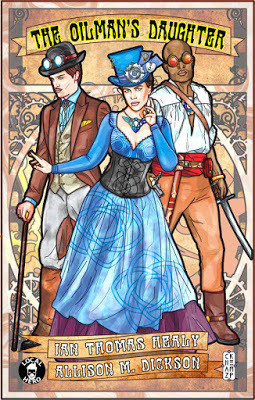
The year was 2009.
Ian Healy and I were both laying down the tracks for our individual writing careers. I'd written and published some short stories, and I'd finished one novel that hadn't yet seen the light of day and had a few others in various states of completion. He'd written a lot more than that, mostly the books in his Just Cause series, but he had a pretty sizable collection growing, and neither of us had quite jumped into the indie publishing ring just yet.
He then came up with this idea that maybe we should combine our talents and write a book together.
And I was basically like, eh . . . maybe?
I don't often enter easily into collaborative projects. Suffice it to say that my writing is a bit like my own personal padded room where no one else can follow. My ideas, my voice, my world. Mine mine mine. I'm greedy like that.
But he persisted. He believed in us, or more specifically me, and he also had a pretty radical idea for a story. In fact, he had the first six or seven chapters roughly outlined already. "It's steampunk. It's about this nuclear powered train. In space. We should totes write it together." (I'm paraphrasing).
And I was basically like, "Huh? Steampunk? Space trains? I don't get it."
I scoffed and balked and resisted. I tried every possible way to shoot this weird ass idea out of the sky. Part of me really didn't want to do it because it didn't feel like my idea. My goal has never been to be someone else's writer monkey. I almost resented the notion.
But then he wrote the first chapter and sent it to me. And then he said, "You would write the next chapter, and then I would write the one after that, and so on and so forth. My character, your character. You get to make him completely your own."
I had to admit that appealed to me. If I was going to have a hand in this story, it was going to be as the sandblaster, adding the grit and the nasty. As I do. So I read his chapter and then took a stab at mine. It was the one where Phinneas Greaves, gnarly space pirate, invades the space train with his crew to kidnap this French lass for some secret she carries that some businessman wants.
It was the hardest writing I'd ever done. I didn't understand the universe yet. It was so radical and outside my comfort zone that I was pretty sure I had bombed it. I was still gnashing my teeth at this whole concept, but at the same time, I tried to see it for the valuable brain exercise it was. Ian had to hold my hand quite a bit through those early chapters, helping to refine the action and the scenery stuff (that first space battle scene? I'll go ahead and admit it -- that was all Healy). I hated that he could see this world so clearly in his mind, while it was still very vague in mine.
But then time passed. Things got a bit easier. He edited the chapters I sent him, and I edited the chapters he sent me. The process helped to ensure that there was some continuity throughout the book with voice. We both started get a sense for how we worked together. If he wanted to make a change, I was okay with it. I was still a little timid about suggesting changes to him, though, and I think if I could do things differently, it would be to jump in and be more proactive in the process.
Then I moved to Ohio halfway through the book and we put everything on hiatus. I don't think it was until early 2011 when we finally put pen to paper again. We started really fleshing out the second act and refining the plot and the characters. The third act was where things really caught fire. We were making all kinds of breakthroughs, and it was pure adrenaline. I was invested, he was invested. When we finished it, I was elated.
Then we went through the beta process, revisions, and eventually tried to get an agent. Months and months of querying commenced, but after some early promise, we struck out. There were some who just had a problem with the early character development. Maybe the book wasn't quite done yet. By that point, I was heavy off into my own work again. I'd just signed The Last Supper and I was making moves with Hobbes End Publishing. I thought maybe we needed to trunk the book and just chalk it up to a valuable learning experience.
So we put it away. A few more years passed. Occasionally Ian would nudge me about fixing OILMAN'S DAUGHTER and releasing it ourselves through his spiffy new publishing company, Local Hero Press. I resisted. In fact, by then I'd totally disowned the book. I even tried to just give it to him. "Here, take this book and make it yours." But he didn't want to do that. I just didn't have the time or the desire to do the work, and so it continued to sit.
More time passed. Early spring of 2015, we started tossing ideas back and forth about how we could make the book better. I also noticed a big gaping hole in my fall calendar with no new releases. I said we could release it if I were allowed to go through to do some more character development work, to address some issues people had with the original draft, and also to bring it up to the standard we were currently working at. And so I got rolling on it, and after a few weeks, we had a new draft that I was finally proud to put my full stamp of approval on. Meanwhile, Ian commissioned Chaz Kemp to make a gorgeous cover, and slowly but surely, the book we'd started writing together six years ago became a thing of reality.
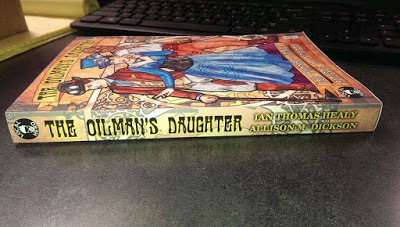
It's really real, y'all!
It's releasing in just a couple weeks. Tomorrow, you will be able to read the first three chapters. Two of them at the Local Hero Press blog, and one of them here. Comment on all three chapters, and you will be entered into a drawing to win a signed copy.
Those who read most of my work will see that this is completely unlike anything I've ever worked on before. But in fact, it was my work on this book that resulted in my own anachronistic COLT COLTRANE series. If Oilman's Daughter hadn't happened, there would simply have been no Colt and Petey.
I resisted this project a lot over the years, but it is in my nature to resist most things. Ian believed in it and in me long after I'd given up. If I have learned anything from writing a book with someone else, it's that I'm still too quick to fold when I still have some decent cards worth playing, and I need to make sure I bring myself completely to the table without hesitation. Holding back cost us a lot of years. And even if this whole thing fails and no one either likes or buys our book, I am grateful to have had the chance to write with a friend who is as trustworthy and open-minded as Ian has been through this whole process. I hope we get to do it again sometime.
Now be sure to grab a copy and let us know what you think!
Published on September 15, 2015 11:32
August 31, 2015
The Doctor Who Project: Ranking Series 8

Hello again, Whovians! We have a lot of new stuff happening right now. A new Doctor, a new series, and a new companion! Well, the companion in this case is the one who is joining Justin and I here at the Doctor Who Project for this new series of reviews. Say hello to fellow Whovian, Tiffany Kelly! She's not only a great person and a big fan of the show, but she's also an amazing chalk artist. Be sure to check out her page!

Chalk N' Awe, baby!
For those who haven't been with us before, I'll give you a quick rundown. First, be sure to check out the other reviews from the previous seven series here. That page is jam-packed with fun info on how we've ranked episodes, series, companions, Christmas specials, etc. You can vote on some of your favorites/least favorites. As of right now, series 3 is winning with an average of 7.1 Sonics. We rank from each episode between 1 and 10 Sonics, and then I average all the episodes together to come up with an overall ranking.
As an added bonus, at the bottom you will find two reviews from Justin for animated specials featuring David Tennant.
Will series 8 beat out series 3? Let's find out!
When Peter Capaldi was introduced as the new Doctor, I was ecstatic. He's a stellar actor, he's older, and so we're pretty much inured against the Pretty Boy Puppy Love (PBPL) thing that has more or less plagued the show since its reboot. After Smith's arc, it was time to wipe the slate clean and give the world a Doctor who was a bit more lean and mean and openly Scottish.
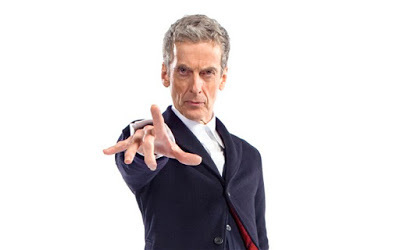
Mission Accomplished
I have truly enjoyed watching Capaldi come to his own over the course of this series. His expressive face manages to reveal about ten different emotions at once. He doesn't hold back his feelings, no matter how much they might hurt, and there were several moments throughout these episodes where I winced out of empathy for Clara, or whoever else had to share company with this cantankerous new Doctor. In many ways, he's like an amalgamation of all the previous Doctors before him, and judging by the trailer for series 9, it looks like his evolution has continued by leaps and bounds. But let's start at the beginning, shall we?
(A quick note: all series synopses are courtesy of IMDB).
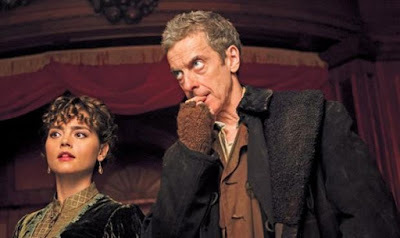
Episode 1: Deep Breath
When the newly-regenerated doctor arrives in Victorian London, he finds a dinosaur rampant in the Thames and a spate of deadly spontaneous combustions.
Justin: The title alone tells you what to do to prepare for the newest Doctor played by Peter Capaldi. An interesting question raised is the face. Peter played Caecilius in the Fires of Pompeii, and the Doctor comments that he's seen the face prior. Does this mean all the Doctor's looks are based on someone else? The Doctor's grit in this episode makes me believe he could kick every other Doctor's asses. My one complaint about the episode would be the Paternoster Gang (Vastra, Jenny & Strax), who worked so well with Matt Smith's Doctor, but not so much with Peter's. Maybe that was the point: you can't go home again. An overall good start for the Doctor. 6 Sonics
Tiffany: I wasn't sure how I would do with this change of doctors. I'm a late to the party Whovian, and I didn't really take kindly to Matt when he showed up after David's exit. It took me several episodes to warm up to him. Luckily I liked Peter right away, and fell in with his crotchety old man shtick. Plus him sniffing out a piece of chalk under the radiator did him loads of good in my book. As for this episode, I really loved it. The banter between 12 and Clara was great, and reminded me of my favorite interactions between 10 and Donna. I loved Strax and Vastra. And, come on, who didn't bawl like a baby when 11 called Clara?! Overall, I thought this was a good episode, and a great intro to 12. 9 Sonics
Allison: Post-regeneration episodes have been hit and miss with me so far (though admittedly, in this reboot run, we've only had three). I didn't like Tennant's debut episode, because he slept through most of it. I loved Matt Smith's debut and the clever way in which it played with time and the way it introduced the Doctor's connection to Amy Pond as a little girl. It was a delightful palate cleanser after Tennant's gut-wrenching departure. How would "Deep Breath" stack up? Well, for me, somewhere in between. I loved Capaldi right off the bat. In particular his line when he notices his changed accent: "I'm Scottish! I can complain about things." The story surrounding this new Doctor, however, was a bit wobbly at times (I second Justin's line about the Paternoster Gang just feeling out of place with this new guy) but I loved how it introduced a darker side to this regeneration right off the bat, as well as the interplay between him and Clara. It made me want to jump immediately into the next episode. 7 Sonics
Average Sonics:

x 7.3
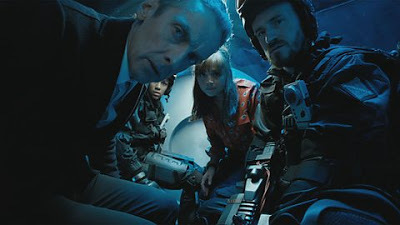
Episode 2: Into the Dalek
The Doctor and Clara find themselves inside of a supposedly good Dalek.
Justin: The Doctor is a jerk, and I love it. I think it's a great contrast to Smith's take. I like to say the Doctor will kick your teeth in to fix your smile. This episode had the always great villain: The Doctor...err...I mean the Dalek. I'm a fan of miniaturizing stories, and this delivered with the insightful insides of the infamous exterminating androids (that's what they really are). The introduction of Danny Pink was okay, but the Doctor's reaction to Clara's good mood was better. 8 Sonics
Tiffany: I didn't love this one. I don't do well with the super sci-fi, industrial, outer spacey episodes. 3 Sonics
Allison: I must say, this is a pretty heavy episode. The writers don't hesitate to delve right in to what makes this new Doctor tick. He's really not a nice guy, and he's carrying a lot of deep-seated anger inside him. This episode in many ways mirrors the "Dalek" episode way back in the Chris Eccleston run, where we not only see the Doctor confront his age-old enemy, but where we also learn how similar they are in fundamental ways, and how scary it can be to confront your own darkness in someone you claim to hate. This was all mastered by a creative plot device that shrunk down our heroes and put them inside a Dalek, allowing them to become subject to all the obstacles (antibodies, anyone?) within. We also get introduced to Danny Pink, who made a good first impression on me, at least. 8 Sonics
Average Sonics:

x 6.3
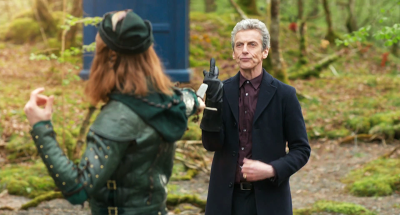
Episode 3: Robot of Sherwood
In Sherwood forest, the Doctor finds an evil plan from outer space and makes an alliance with Robin Hood. With Nottingham at stake, the Doctor must decide who is real and who is fake.
Justin: Rrrrrobin Hood (I tend to hear the Disney version of Prince John in my head when I say that name) and his Merry Men are the focus of this hysterical episode. My biggest complaint (as you've hopefully read in the past reviews) is the show's way to take a classic fictional character (vampires, werewolves etc...) and turn them into robots or aliens or something that it wasn't. "Why can't they just commit?" I would continue to ask. A time-traveling two-hearted human looking alien can exist, but the Loch Ness can't? Well, this episode finally committed to what I wanted to happen, and explained why Robin doesn't exist as well. Oh, and it ties back into the Promise Land. 7 Sonics
Tiffany: In complete contrast of Into The Dalek, I loved loved loved this episode. It was one of my favorites. I thought it was smart, funny, and visually beautiful. 8.5 Sonics
Allison: Sorry to be the bummer here, but this episode may have started out strong, but it ended on a complete dud note for me as so many Mark Gatiss episodes do. That being said, it had some glorious moments. The spoon. Clara looking absolutely gorgeous. And Capaldi's middle finger. I also liked the actor who played Robin Hood, as well as the creepy introduction to the Promised Land bit that will be carried throughout the season. 4 Sonics
Average Sonics:

x 6.5
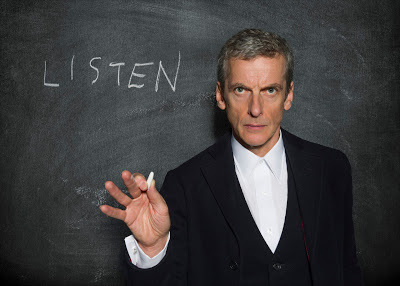
Episode 4: Listen
When ghosts of past and future crowd into their lives, The Doctor and Clara are thrown into an adventure that takes them to the very end of the universe.
Justin: When I saw the trailer for this episode all I could think of was Blink. Maybe it was a companion to the episode? I had no idea going in, but I loved watching it. I was nervous, because I've had a similar nightmare, and kept hoping they would show who was in the room. Another great part was the connection with the War Doctor, and how he finally became a soldier of sorts. I'm continually interested Danny Pink, and I wonder how long it will be before he joins the TARDIS crew. 10 Sonics
Tiffany: This was another one I really enjoyed. I loved how this one opened up so many questions about how all of the people and situations in the Whoverse are intertwined. 7.5 Sonics
Allison: Ah man, the first shot of this episode, with the Doctor meditating on top of the Tardis was worth all the Sonics alone. But I just adored this episode. Delightfully creepy and twisty-turny in a way that only a Stephen Moffat-penned episode can be. I loved the bit about the toy soldiers, and I also got the sense that much of what we saw in this episode will be referred to not only in future episodes this season, but throughout Capaldi's run. So it's an important episode too. Not only one of the best of this season, but probably one of my favorites overall. 10 Sonics
Average Sonics:

x 9.2
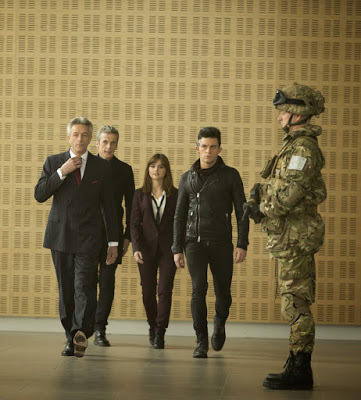
Episode 5: Time Heist
The Doctor and Clara must break into the most secure bank in the universe.
Justin: I love movies like Ocean's Eleven, the Heist and the Score. I also thought this episode looked a little blah from the trailers. I figured it was the down to Listen's up, but it was a loop instead. The episode kicks right off, and jumps into an intense and fun filled episode that continues to tie into the overall arc for this season. I was also cracking up by the jokes our Doctor made. Capaldi's grit continues to shine, yet you can clearly see he cares about the companion he keeps at arm's length. 9 Sonics
Tiffany: Meh, pass on this one for me. 2 Sonics
Allison: I'm a sucker for a good heist, and this one has some interesting twists and turns that I didn't expect along the way. It also has classic suspense thriller staging, with the climactic event almost happening at the very beginning, and the episode reeling out to reveal everything that came before. Another thing I liked about this episode was the supporting cast. It isn't always strong or terribly memorable, but in this one we had some great heist members on the team with some cool tech, and I also enjoyed Keeley Hawes as the deliciously evil bank administrator. 7 Sonics
Average Sonics:

x 6 Sonics
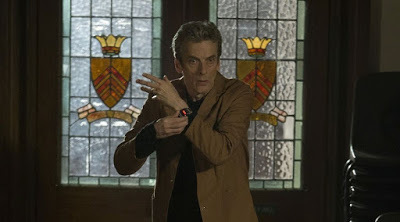
Episode 6: The Caretaker
The terrifying Skovox Blitzer is ready to destroy all humanity - but worse, and any second now, Danny Pink and the Doctor are going to meet.
Justin: Doctor New continues to bring us another wonderful episode. This time he goes undercover as a caretaker for Coal Hill (the school Clara works at, and the place his granddaughter attended in the first Doctor Who episode.) to uncover an alien threat. What I really enjoyed was the duality of Clara (her personal life vs her adventurous one), and how the writers let you finish their slightly shown adventures. Oh, and the Doctor's inability to understand they Danny Pink isn't a P.E. teacher was hysterical. Plus the idea that the Doctor didn't just take on the role of caretaker for the school, but the fact that he's there to take care of Clara. 8 Sonics
Tiffany: This was a fun episode. I liked Twelve's reaction when he thought Clara's beau was his doppelgänger, and his reaction to Danny when he realized that was Clara's boyfriend. It shows that the old Doctor is still in there. You can change the face, but you can't change the man. 8 Sonics
Allison: Some great humor in this one as we start to see Clara's two separate lives colliding. One where she's the Doctor's companion, and one where she's a basic school teacher carrying on a romance with her colleague Danny. We knew the moment would come when the Doctor and Danny would have to meet, and of course we could expect the two would grate against each other like sandpaper a baby rash. One thing I appreciate is how this whole setup could have become mired in sentimental schmaltz, and yet it remained above all that. This new Doctor doesn't have time for any of that syrupy nonsense. Also, we're getting more of Missy here. The big mystery of the Promised Land continues to build. 8 Sonics
Average Sonics:

x 8
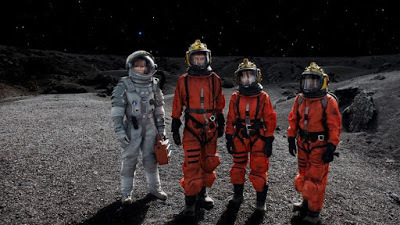
Episode 7: Kill the Moon
In the near future, the Doctor and Clara find themselves on a space shuttle making a suicide mission to the Moon. Crash-landing on the lunar surface they find the most terrible things.
Justin: This episode was about to kill my spirits for this current season, and then everything flipped around with the reveal about the moon, and followed by the Doctor's amazing spin on who can really save the Earth. It can be looked at that we the viewer are the companion. We travel with the Doctor as he takes us on wild adventures. Ten and even more so with Eleven were for beginners (sorry, Nine) or the teenager inside us all. Twelve is telling us it's time to take off our training wheels and grow up with the show. 7 Sonics
Tiffany: This was a pretty good episode. Intense. I don't like spiders, so that was creepy. 5 Sonics
Allison: This Doctor definitely seems to be struggling a lot with caring for people, which I think is a logical offshoot given the previous Doctor's arc, where he struggled with feeling too god-like. This introduces a lot of tension into the mix with Clara and him, and the whole mixture kind of bubbles over as he forces her to make a decision that could affect all of humankind. The ending of this will make most scientists scream in indignation, but unlike the goofy golden arrow in the Robin Hood episode, this one works in a fun and whimsical sort of way. 6 Sonics
Average Sonics

x 6
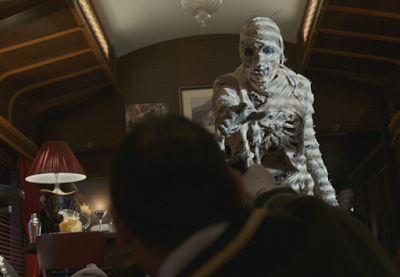
Episode 8: Mummy on the Orient Express
On the most beautiful train in history, speeding amongst the stars of the future, a deadly and immortal creature is stalking the passengers.
Justin: I was really excited about this Clara free episode, and then I discovered she was in it. There were many good things in this episode (from the jelly babies to the "are you my mummy" line), but in the end it wasn't the greatest of the newest season. I really liked the monster of this episode, and expected him to be tied into the villain from Deep Breath. Again, I would have liked this more if it didn't have Clara (which was how it was promoted). 6 Sonics
Tiffany: I think I'm partial to period stories. I liked the setting, I liked the story line, I liked the delivery. I thought the part when 12 discharges the soldier was very well done and touching. 8 Sonics
Allison: I'm with Tiffany on this one. The "period" episodes of Doctor Who always manage to be my favorite, but I like how this one had a twist, because while it looked like an old timey episode, it managed to employ far future tech (space trains, holla!) and an interesting device that preys on passengers who are the most medically vulnerable. I've enjoyed how a lot of these episodes this season have added interesting twists to standard sci-fi tropes. I also like how this episode seems to have a theme of how the Doctor deals with his view of soldiers and combat. 8 Sonics
Average Sonics:

x 7.3

Episode 9: Flatline
A problem happens with the Tardis, trapping the Doctor inside and leaving Clara to fend for herself against a two dimensional enemy.
Justin: I should note I've rewritten this review several times since watching it, and this review (unlike the rest) was typed after the season--yet prior to the Christmas episode. I finally figured out why I like Clara this season. She is the Matt Smith Doctor. She's the bridge from going from Smith to Capaldi of this season to the next season--where I think Capaldi will really shine. This episode was funny and terrifying. An interesting one that made the Doctor feel small. Clara shined even more in this companion focused episode, and I had no idea how she was going to make it out alive. 8 Sonics
Tiffany: My favorite part of this episode is the tiny TARDIS. This was an okay episode for me. Not a top, but not one that I got bored with. It's also interesting to watch the Doctor's internal struggle with his relationship with Clara. I can tell that he is fond of her, but he's trying so hard to keep his feelings "professional". 5.5 Sonics
Allison: Man I loved this episode. The shrinking TARDIS was such an original idea and gave a lot of opportunity for comic relief, which was needed because of the creepy concept of people being absorbed into 2-dimensional surfaces by alien creatures who are attempting to observe or possibly take over a three-dimensional world. You'll never look at murals the same way again. Clara has really grown so much in this season, becoming an equal in her own right, as well, something I've enjoyed quite a bit. The idea of "companion" suggesting a submissive role seems to be evaporating, and I'm completely okay with that. 8 Sonics
Average Sonics:

x 7.2
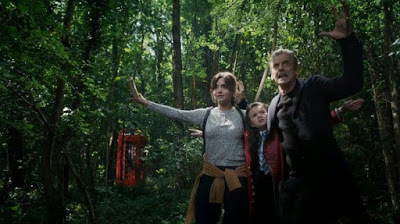
Episode 10: In the Forest of the Night
One morning in London, and every city and town in the world, the human race wakes up to the most surprising invasion yet: the trees have moved back in. Everywhere, in every land, a forest has grown and taken back the Earth.
Justin: A day or so prior I was about how originally the Doctor had his granddaughter Susan and two Coal Hill teachers tagging along, and then later younger companions. I'm guessing this had to do with attracting kids to watch the show (originally it was meant to be an educational show, but use time travel to rope children into watching). I started to wonder how this would work with the current Doctor, and this episode played on that idea. I didn't think it was a great episode (compared to the prior episodes), but I believe this was a breather episode to let you rest before the the final two. I really enjoyed the fish eye camera to show the inside of the TARDIS. I'm going to give it a slightly higher sonic rating than it deserves, because I think it was a good kid's show. 5 Sonics
Tiffany: I liked this episode. The forest covering all of London made a bizarre, creepy backdrop for this story. While I know it could never happen, being a mom watching this made me feel helpless for the parents who's kids were with Clara and Danny. 7.5 Sonics
Allison: I go back and forth on this episode a lot. On the one hand, I can see how it has had mixed reception. Of all the episodes this season, this one feels the most juvenile, which is really not a bad thing. It is, after all, a show intended for kids. I think the beginning and the middle are strong, and the resolution doesn't quite live up to it. It feels way too "neat" and a bit corny for my taste. But overall not a bad one. Moffat says it was the most underrated episode of the season, but I think I'll have to disagree with that. 6 Sonics
Average Sonics:

x 6.2
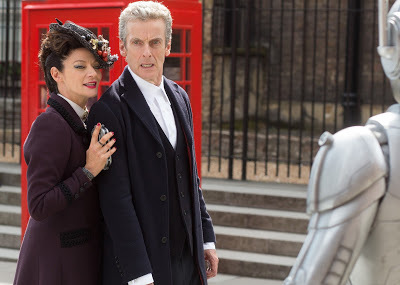
Episode 11: Dark Water
In the mysterious world of the Nethersphere, plans have been drawn. Old friends and old enemies manoeuvre around The Doctor, and an impossible choice is looming over him.
Justin: What an exciting and very sad episode this was. There are things you wait to see upon seeing a trailer for the next episode (an advantage to watching a show on Netflix), and you start to make a mental check off of those things as the time clicks down. This episode kept making me forget that list because of the journey of Danny Pink. Clara has some horrendous moments as well, and the Doctor's many emotions through the show are brilliant. Then there's Missy (and the big reveal): her character continued to pop up through the season, and has been referenced to be around prior to the Bells of St. John. 9 Sonics
Tiffany: This one was so sad. While I'm kinda ready for Clara's companion time to come to an end, I thought she did such a great job here. And then, to have Missy reveal her identity!! What???!!! 7 Sonics
Allison: This episode had so many pinnacle moments, and it started off with a major surprise and heartbreak. The high emotions continued pretty much all the way through, with Jenna Coleman giving her best performance on the show yet (the showdown between her and the Doctor with the key had me forgetting to breathe). Then we continue on to the very creepy setting of the Nethersphere, and decent use of the Cybermen, who seem to be getting more entertaining as the show evolves. We also find out who this Missy woman is, and honestly, it's as I'd suspected from the beginning, but it was still a great reveal to watch. 9 Sonics
Average Sonics:

x 8.3
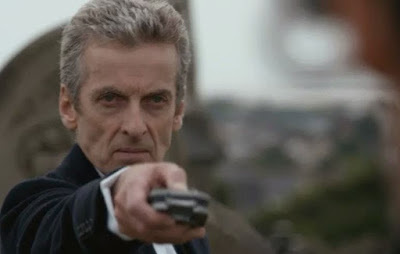
Episode 12: Death in Heaven
With Cybermen on the streets of London, old friends unite against old enemies and the Doctor takes to the air in a startling new role. As the Doctor faces his greatest challenge, sacrifices must be made before the day is won.
Justin: The final episode of the official season wrapped almost (the pregnancy) everything up not so nicely. Missy is a wonderful nemesis to the current Doctor. The previous Master played Ten's opposite rather well, and Missy (played by) was every bit as dark as Capaldi. Makes me wonder what Smith's Master would have been like? I was really excited to think Osgood could be the Doctor's next companion, but quickly realized that Miss Bananas wouldn't let that happen. I felt bad for Clara and Danny, but I didn't want her to turn Danny into a Cyberman. Danny's point about the Doctor was very nicely made as the Doctor knew he had to turn Danny off. The ending scene in the diner with all its lies about happiness was quite beautiful. This Doctor is not the one Clara knew and I think she finally understood him. 10 Sonics (originally a 9, but the messing with the opening credits bumped it up a point.)
Tiffany: Well, this is a heartbreaking way to leave the season, is it? Not as bad, for me, as 10 and Rose, but still a sad, well delivered episode. With the speculations that Clara might be pregnant swirling, I'm excited to get back to the series and see if that holds any water. 8 Sonics
Allison: Ahhhhhh so many feels in this episode. The performances of Capaldi, Coleman, and Michelle Gomez (The Mistress) were almost TOO good, if that makes any sense. But that also manages to be a major plus. Their talents rose well above what is in many ways a show that doesn't specifically rely on top-notch acting, but it was that top-notch acting that managed to sell some of these most outlandish plots. And it's also what makes Capaldi such a powerful Doctor, even if he hasn't always played front and center in every episode. And of all the arcs I'd tried to predict or wish for Danny, I never would have imagined this. It was sad and in some ways a major letdown. I wanted so much more from him. But I'm not quite sure we've seen the last of him either. 9 Sonics
Average Sonics:

x 9
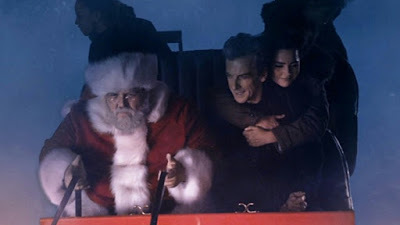
Episode 13 (Christmas Special): Last Christmas
The Doctor and Clara face their Last Christmas. Trapped on an Arctic base, under attack from terrifying creatures, who are you going to call? Santa Claus!
Justin: I loved this episode. By far my favorite Whomas episode to date (I didn't care for many of Smith's 25th of December episodes). As a kid I was a big believer in Santa. I thought other kids were crazy about him not being real, and TV shows would usually show he was real by the end of the episode (check out Punky Brewster). Having old St. Nick (played by Nick Frost--a fitting name for the person playing Santa) in it with two sarcastic elves (one played by Dan Starkey--the actor who played Strax (also the only other actor besides Capaldi and Coleman to be in the first and last episode of the season) was brilliant. Then you mix in two movies I love: Alien and Thing, and you have non-pudding brain move number two. After you have Capaldi's Doctor being awesome and potentially seeking out a new companion all while taking and giving jabs with Santa you mix in another of my favorite storytelling devices: dreams. All of this and an ending that gave me goosebumps (even though Facebook spoiled it for me), and I'm ready for Series Nine. Thank you Moffat, Capaldi, Coleman and crew, you made me believe in Christmas in the Whoverse again. 10 Sonics
Tiffany: Another fun and emotional episode. I like a lot about this one, especially Santa, because SANTA!!! But, I thought the "Christmas Carol" vibe was nice when Twelve visits old Clara and is able to stop the regret of too much time passing. 8 Sonics
Allison: This probably my favorite Christmas episode after the Snowmen one (overall, I think Smith had the best Christmas specials, but Capaldi's first has really set the bar high). I particularly love how it combines some of my favorite sci-fi. A little Inception here, a dash of Alien there, along with a beautiful meeting between the Doctor and an elderly Clara that reminded me a bit of Peter Pan when he comes back to visit Wendy only to find she's grown old. The Christmas episodes tend to bridge over into campy town more often than not, but this is one where I truly felt the magic. 9 Sonics
Average Sonics:

x 9
Bonus Material:
Our perennial overachiever, Justin, has additionally reviewed two David Tennant animated specials. Their Sonic rankings will not be factored into the overall statistics below, but here they are anyway for your viewing pleasure.
The Infinite Quest
Even though this takes place before Dreamland (below), I ended up watching it after that episode. Watching Doctor Who doesn't have to be linear. Martha, Martha, Martha. How I loathe Martha. However, the episode wasn't that bad, and became quite brilliant in some parts (though not many). The animation was flash based and pretty awful at times, but hearing Tennant speak as the Doctor some more was a treat. Anthony Head (who played Mr. Finch in School Reunion) was the bad guy (again) in this episode. My favorite part was the Doctor in prison. 3 Sonics
Dreamland
Coming across a Doctor Who episode you haven't seen is a thrilling experience. It was by accident I found this on Hulu, and I thought it was deserving of a review. Taking place between Water For Mars and the End of Time (even though Day of the Doctor takes place before End of Time as well), the good Time Lord finds himself at Area 51 in 1947. Tennant reunites with his daughter/wife, the lovely Georgia Moffett who plays Cassie Rice. They fight a aliens, government spooks and the army all in one episode. The animation reminded me of the graphics from the video game Goldeneye on a bad day. I enjoyed the Doctor teaming up with a new companion, and found the episode to be overall enjoyable. 6 Sonics
Episodes Ranked Best to Worst:
(like colors indicate a tie)
Listen: 9.2
Death in Heaven: 9
Last Christmas 9
Dark Water: 8.3
The Caretaker: 8
Deep Breath 7.3
Mummy on the Orient Express: 7.3
Flatline: 7.2
Robot of Sherwood 6.5
Into the Dalek 6.3
In the Forest of the Night: 6.2
Time Heist 6
Kill the Moon: 6
Average Sonic Ranking For The Season:

x 7.2
And there we have it! With that overall score of 7.2 Sonics, Peter Capaldi's first season managed to beat out the perennial favorite series 3 by .1 Sonic! I also think this season is unique because none of the episodes managed to average below a 6, even though some of us individually might not have cared for a particular episode. In retrospect, I think this season was the most consistent across the board of all of them. The writing was generally stronger, and while I think the budget felt a tad bit lower for this season, it seems like they managed to deliver a lot of bang for the buck story and performance-wise. Capaldi has absolutely sold us, and we cannot wait to see what the next season brings!
And please, feel free to chime in and let us know what you think of these episodes. What was your favorite/least favorite moment or episode of the season?
Until next time, Whovians!
Published on August 31, 2015 22:50
August 18, 2015
In Defense of Participation
Thanks to a discussion I had on a friend's Facebook page today, I'm in the mood to pontificate on competition, what it means to be successful, and what I feel is this toxic belief that only the winners of the world should get to celebrate or receive recognition.
Many of you will probably disagree with me. You may even come armed with anecdotes, witticisms, statistics, and other things designed to dissuade me of my namby pamby mentality on this, but in this case, I'm not so sure I care. Because my argument is purely emotional here. And sometimes, (maybe not every time), I feel like the emotional argument is the right one to make.
I'm going to start by showing you this meme I've seen floating around Facebook this week:
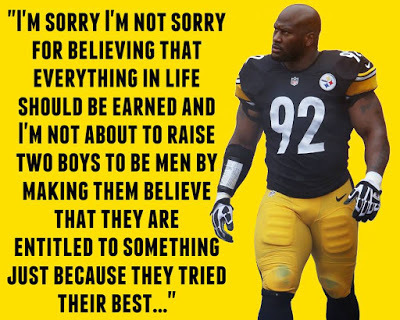
That's James Harrison of the Pittsburgh Steelers. I'm sure he's a good guy. I'm sure he loves his kids and wants them to succeed every bit as much as I love my kids and want them to succeed. I recognize that there is no one recipe for success in this crazy world of ours, and that the definition of the word isn't even the same across multiple parties. We all have a path to walk and a destination we'd like to reach, and we usually start off in the shoes that were handed to us. If we're lucky, we'll get to wear a lot of different shoes along the way, hopefully better ones, but some people aren't so lucky.
I'm digressing, but my point is, I really fucking hate what Harrison said.
I hate how it breeds a pathological brand of perfectionism. And I really just hate how mean it sounds, and how people are sharing this with such primal grunts as, "Yeah! Teach them kids how to be MEN!"
Like there is only one way to be a man.
I also hate how it puts the focus merely on winning, and not on the courage and effort and sacrifice it takes to even try. In a football player's case, to suit up in pads and other gear and beat your body completely to shit for the entertainment of others. Never mind that whether you win the game or lose the game, the fact that you're even on the team in the first place is a pretty fucking great achievement. Some people don't even bother trying out for anything. They dream of the glory and satisfaction and money success often brings, but they don't go out for the team or audition for the play or apply for a particular job or submit their stories to the publishers...they don't put themselves out there period, because they're so afraid they'll fail.
And why are they so afraid of failure? Because they've been taught to. They've been fed reams of bullshit by the James Harrisons of the world, but they've never been taught the VALUE of simply trying, especially when the odds are not in their favor. They haven't been taught how to turn losing moments into learning ones. They only see the promised land winning and dismal shame bucket of failure.
Maybe you didn't win, but you gained new knowledge to carry with you to your next effort. Maybe you tried your best, but someone else won anyway. Because that happens. The world is full of people with myriad abilities, and some of them will climb that mountain faster. Some of them will have a helicopter to take them up. Someone of them were fucking BORN up there. We're all traveling at different speeds. Loss at various points along the way is inevitable, but we should want to keep trying not only because of the potential to win, but also because the journey itself is worthy and it's worth taking for everything else it offers us.
If your kid is on the losing team, why not still them a goddamn ribbon for showing up? Why is this so harmful? Are we in such a hurry to emotionally beat up children for not being top dog because we so keenly remember our own pain at that age? That gnawing inadequacy that grew up with us and still haunts our every decision and accomplishment? That makes it impossible to accept compliments or to look a loss in the face without seeing every single glaring flaw in our character staring back at us?
Is that even healthy? I don't know for sure, but I can say it certainly isn't pleasant, and I can also say that it's been damaging to me. How much further might I have stretched myself in life if I hadn't been so terrified of failure?
Oh, but the world will shit on them as adults, so we need to prepare them early by making sure they're shat upon, right?
Give me a damn break. Yeah, the world shits on everyone from time to time. It's inevitable. But how about preparing them to weather it better by teaching them how to be kinder and more optimistic and more compassionate people? Maybe the world would produce LESS shit in the first place if it were run by those who didn't see losing or being the runner-up as a character flaw, by those who thanked people for playing, for giving it a go when others didn't.
Because there is SO MUCH value in "Hey, at least you tried." I wish we saw more people who acknowledged that, who didn't see it as a throwaway phrase. I wish more people fostered the enjoyment of a complete journey and not just in the destination.
And then there is my favorite: "When you give every kid a trophy, the trophy becomes meaningless."
Maybe the trophy itself is part of the problem. Maybe exceptionalism hasn't done us a whole lot of good, after all. I think about this a lot. I look at the world I'm living in now, and I wonder if we've been doing it right, if we should shift our thinking in a new direction. While the promise of a gold medal and fame drives a lot of people to succeed, I think what gets lost in the shuffle are SO MANY MORE people who see that game for the losing proposition it is and then don't even bother trying at all. Those are the people I'd like to reach. That is the potential I'd like to unlock. There is a greater power to be tapped there, and it could transform the landscape of this world.
Besides, if your achievements in life only mean something when you can boast about them or wag them in the face of people whom you deem failures or losers, then maybe you need to reevaluate.
Because from where I'm sitting, admittedly in the nosebleed seats of life, all the power and influence resting in the hands of a few elites is what's turned this world into a place where it feels harder every single day just to stay afloat.
I guess I'd like to see a world with a little less of the above, and a little more of this:
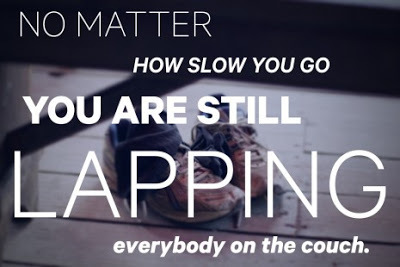
In other words, if you're out there doing your thing, if you're TRYING, if you're giving it everything you have, even if you're not in first place, you deserve props. Win or lose, you matter. You're doing something. You're a part of this world in your own unique way. Give the kids a goddamn ribbon instead of a rebuke, and maybe, just maybe, they'll avoid the resentment, shame, and fear that shackles so many of us well into our adult lives, and they'll keep going.
Many of you will probably disagree with me. You may even come armed with anecdotes, witticisms, statistics, and other things designed to dissuade me of my namby pamby mentality on this, but in this case, I'm not so sure I care. Because my argument is purely emotional here. And sometimes, (maybe not every time), I feel like the emotional argument is the right one to make.
I'm going to start by showing you this meme I've seen floating around Facebook this week:

That's James Harrison of the Pittsburgh Steelers. I'm sure he's a good guy. I'm sure he loves his kids and wants them to succeed every bit as much as I love my kids and want them to succeed. I recognize that there is no one recipe for success in this crazy world of ours, and that the definition of the word isn't even the same across multiple parties. We all have a path to walk and a destination we'd like to reach, and we usually start off in the shoes that were handed to us. If we're lucky, we'll get to wear a lot of different shoes along the way, hopefully better ones, but some people aren't so lucky.
I'm digressing, but my point is, I really fucking hate what Harrison said.
I hate how it breeds a pathological brand of perfectionism. And I really just hate how mean it sounds, and how people are sharing this with such primal grunts as, "Yeah! Teach them kids how to be MEN!"
Like there is only one way to be a man.
I also hate how it puts the focus merely on winning, and not on the courage and effort and sacrifice it takes to even try. In a football player's case, to suit up in pads and other gear and beat your body completely to shit for the entertainment of others. Never mind that whether you win the game or lose the game, the fact that you're even on the team in the first place is a pretty fucking great achievement. Some people don't even bother trying out for anything. They dream of the glory and satisfaction and money success often brings, but they don't go out for the team or audition for the play or apply for a particular job or submit their stories to the publishers...they don't put themselves out there period, because they're so afraid they'll fail.
And why are they so afraid of failure? Because they've been taught to. They've been fed reams of bullshit by the James Harrisons of the world, but they've never been taught the VALUE of simply trying, especially when the odds are not in their favor. They haven't been taught how to turn losing moments into learning ones. They only see the promised land winning and dismal shame bucket of failure.
Maybe you didn't win, but you gained new knowledge to carry with you to your next effort. Maybe you tried your best, but someone else won anyway. Because that happens. The world is full of people with myriad abilities, and some of them will climb that mountain faster. Some of them will have a helicopter to take them up. Someone of them were fucking BORN up there. We're all traveling at different speeds. Loss at various points along the way is inevitable, but we should want to keep trying not only because of the potential to win, but also because the journey itself is worthy and it's worth taking for everything else it offers us.
If your kid is on the losing team, why not still them a goddamn ribbon for showing up? Why is this so harmful? Are we in such a hurry to emotionally beat up children for not being top dog because we so keenly remember our own pain at that age? That gnawing inadequacy that grew up with us and still haunts our every decision and accomplishment? That makes it impossible to accept compliments or to look a loss in the face without seeing every single glaring flaw in our character staring back at us?
Is that even healthy? I don't know for sure, but I can say it certainly isn't pleasant, and I can also say that it's been damaging to me. How much further might I have stretched myself in life if I hadn't been so terrified of failure?
Oh, but the world will shit on them as adults, so we need to prepare them early by making sure they're shat upon, right?
Give me a damn break. Yeah, the world shits on everyone from time to time. It's inevitable. But how about preparing them to weather it better by teaching them how to be kinder and more optimistic and more compassionate people? Maybe the world would produce LESS shit in the first place if it were run by those who didn't see losing or being the runner-up as a character flaw, by those who thanked people for playing, for giving it a go when others didn't.
Because there is SO MUCH value in "Hey, at least you tried." I wish we saw more people who acknowledged that, who didn't see it as a throwaway phrase. I wish more people fostered the enjoyment of a complete journey and not just in the destination.
And then there is my favorite: "When you give every kid a trophy, the trophy becomes meaningless."
Maybe the trophy itself is part of the problem. Maybe exceptionalism hasn't done us a whole lot of good, after all. I think about this a lot. I look at the world I'm living in now, and I wonder if we've been doing it right, if we should shift our thinking in a new direction. While the promise of a gold medal and fame drives a lot of people to succeed, I think what gets lost in the shuffle are SO MANY MORE people who see that game for the losing proposition it is and then don't even bother trying at all. Those are the people I'd like to reach. That is the potential I'd like to unlock. There is a greater power to be tapped there, and it could transform the landscape of this world.
Besides, if your achievements in life only mean something when you can boast about them or wag them in the face of people whom you deem failures or losers, then maybe you need to reevaluate.
Because from where I'm sitting, admittedly in the nosebleed seats of life, all the power and influence resting in the hands of a few elites is what's turned this world into a place where it feels harder every single day just to stay afloat.
I guess I'd like to see a world with a little less of the above, and a little more of this:

In other words, if you're out there doing your thing, if you're TRYING, if you're giving it everything you have, even if you're not in first place, you deserve props. Win or lose, you matter. You're doing something. You're a part of this world in your own unique way. Give the kids a goddamn ribbon instead of a rebuke, and maybe, just maybe, they'll avoid the resentment, shame, and fear that shackles so many of us well into our adult lives, and they'll keep going.
Published on August 18, 2015 12:01
July 14, 2015
On Choosing to Self-Publishing the STRINGS Sequel
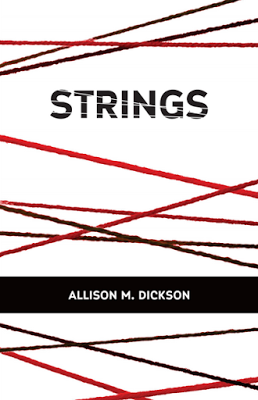
I cannot say enough about how much I have loved working with Hobbes End Publishing for the release of my books STRINGS and THE LAST SUPPER. They have treated me so well, in fact, that the idea of working with almost any other small press (at least one that isn't vetted by my agent or several of my writer friends) makes me feel at least a little reluctant. That isn't to say there aren't any other great small presses out there. I know there are. I have just become incredibly cautious about who I let handle my work. After witnessing too many of my writer friends get burned, I can't imagine being any other way.
As a hybrid author, I have had three goals in mind:
1. Publish with a large mainstream publisher who can distribute my work to the mass market, bookstores, and help get me more overall exposure.
2. Publish with a small indie press titles that may not cross over as well to the mainstream, and who will give me some of the creative control and the collaborative partnership I desire.
3. Self-publish an array of short fiction, novellas, and other work that will allow me maximum earnings potential and the opportunity to explore and experiment with the tools available to independent writers today.
To that end, I have nearly accomplished all three. My agent has two of my suspense manuscripts now that we hope to sell to a large publisher. I have a fruitful relationship with a great small press. And I have launched a pulpy sci-fi series and a load of short stories on my own.
The challenge has always been deciding which route to take with which things I write, particularly in choosing between a small press and going DIY. There are so many small and micro publishers out there, and many of them are making so little money for their authors and doing so little promoting that I have come to feel that for all the time and money and effort spent on packaging and releasing a book, authors (at least ones who are well-versed in this particular landscape) can be better off going the DIY route than they would be by signing their book over to someone else to eat up half the minuscule profits. I mean, if you're going to have minuscule profits anyway, you might as well take the option that gives you the lion's share of them, right?
Again, not all small presses are created equal this way. Some of them are damn good at what they do, and they can make bestsellers happen. It's just very hard to get into these particular publishers, and the best ones might not always be right for something I've written.
My relationship with Hobbes End is far from over, but I have made the decision to publish the sequel to my book STRINGS myself. There are several reasons for this, and they are as follows:
1. I really want this book out in the spring of 2016. Even if I managed to finish the book next week and submit it to Hobbes End, it would probably be at least another year before it was released. While it would be possible for them to get it out sooner, they can't guarantee it, and I'd rather not put that kind of pressure on them when I'm fully capable of getting the book edited, packaged, and released in half the time.
2. My agent is unable to represent my STRINGS properties, because Hobbes End holds the rights to the first book, and trying to rep an orphaned sequel to a moderately successful but by no means blockbuster book is a nightmare no one wants. And trying to sell an orphaned sequel even to a small indie press is also a losing proposition. So if I'm not going with Hobbes End, my only other option really is to do it myself.
3. Having the first book in the series published with Hobbes allowed me to get it a lot of exposure I might not have otherwise gotten if I'd done it myself. The success of the first book will help drive the success of the second one, and I would like the opportunity to be able to take a more hands-on approach with the promoting and printing of the second book or any other subsequent volumes that may follow.
4. I have resources and skills now that I didn't have two or three years ago when I wrote the first story. Since then, I've started doing conventions, I've launched the Colt Coltrane series, and I've expanded my network of skilled peeps who can help me get the book off the ground via editing, cover art, interior design, and so forth. I feel very confident I can handle the endeavor and so I shall.
So there you have it. I'm hard at work on the STRINGS sequel as we speak. It's about 2/3 written, and my goal is to have it released in early March of 2016 and up for pre-order before then. Start spreading the word! I'll keep folks posted on the status of the book (official title, cover reveal, reviews, release date, etc) as the adventure unfolds!
Published on July 14, 2015 14:09
June 11, 2015
Generalized Anxiety, Or When Your Brain Makes You Think You're Dying
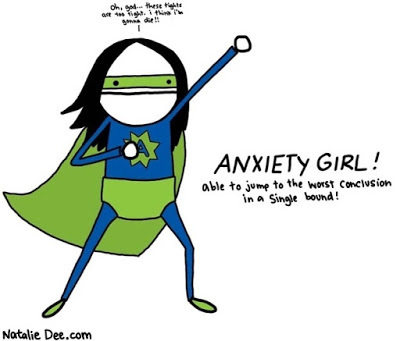
When I try to think of when the problems really started, I come up blank. I guess I've always been a bit of a worrier. But it would come and go. Sometimes, in the middle of the night, the voices in my head would remind me how close to being broke we were or that something in my life just wasn't adding up.
Then after a few days, I would find a silver lining, and the feelings would pass.
But I think it really started when we moved back to Ohio in 2010. No, I'm not blaming Ohio. But the circumstances that brought us there took their toll on my mental well-being. A long stretch of unemployment for my husband caused us to have to reboot our lives and relocate halfway across the country for him to find work, and the person who came out of the other end of that nightmare was a bit more brittle, a bit more prone to worry and breakdowns. They say what doesn't kill you makes you stronger, but I think sometimes it can make you a little crazier too. Even so, I was holding it together okay.
Except then I started having symptoms of irritable bowel. Eating would send me running for the bathroom almost immediately. I tried various diets with limited success, but it never really left.
Then, in the summer of 2011, I was driving back from Columbus to Dayton with my husband when a perfect storm occurred. We nearly had a devastating car wreck while I was behind the wheel thanks to a hugely reckless driver. And a series of tornado-spawning storms were moving through the state. Meanwhile, I received a call from my brother. Our kids were off on vacation nearly three hours away with him, and they were hiding in a shelter when they spotted a funnel cloud near Sandusky. They were all fine, of course, but our drive home was a bone-rattling nightmare.
And I'm not sure I really ever relaxed again after that. Whatever protective coating I had on my nerves had been burned away by the unceasing wash of cortisol and adrenaline from that one day. I guess you could say it was the tipping point between being an occasional worrier to someone who had upgraded her arsenal to panic.
A year later, I had my gallbladder removed.
A year after that, we were forced into an unexpected move by a dickhead landlord who decided he wanted to give his house to his kid.
In other words, stress became an ever-present thing for us, and though we'd always weathered our share of it, I realized I wasn't coping with it as well as I used to. It was leaving a lasting mark.
In that time, I realized I couldn't really drive on the freeway anymore. I'd become certain a tire would blow or that someone would side swipe my car. It was particularly bad if I had one of my kids in the car with me, because I was certain I would get them killed along with me. But even when alone, I would sit bolt upright, gripping the steering wheel like it might fly away, sweaty palms, the panic in my chest like a rat scrabbling to get free, convinced beyond all measure that if I gave into it even a little, the car would spin out of control and I would die. I started looking for ways to avoid social situations that required me to hop on a freeway and drive distances longer than a mile, unless my husband could drive me.
Around 2013, the endless heartburn and reflux started.
In late 2014 came chronic nausea and bad sleep. I would wake up earlier and earlier every day. Then I started vomiting when I awoke, or at least feeling nauseated. I was convinced I had pancreatic cancer. Google was telling me so. Then I was having pain in my right flank. I finally went to the emergency room, and after copious bloodwork and a CT scan, they diagnosed a bladder and kidney infection. I thought with treatment, that would be the end of it.
But the nausea continued into 2015. I went to the doctor, and they did some tests. He said, given my chronic heartburn, I very likely had GERD and to do a round of Prilosec to see if that eliminated symptoms. The nausea went away completely. It was miraculous. I thought I was reaching the end of the whole nightmare.
But then my agent started shopping my novel around in March and the stress REALLY kicked up. I was on the verge of a book deal, and I immediately started obsessing over my own death. The idea that I would never see my dreams come to fruition because I would die first stayed with me day in, day out. Then the chest pains started. And the palpitations. And pain between the shoulder blades. I stopped sleeping again. I would fly off into crying jags for no reason. I would get a twinge in my side and was certain I had appendicitis. In fact, every little unexpected sensation in in my body was a sign of certain death. I couldn't shake the fixation that my mortality was imminent. It was making me paranoid and miserable, and I'm sure I wasn't much of a picnic for the people around me either.
Then one day I couldn't get the chest pains to go away, and after spending an hour reading Google for signs of heart attack, I went back to the doctor. He wasn't even in the room five seconds before I broke down crying. I told him I thought I might be having a heart attack, or that I may just be losing my mind. That I couldn't get my thoughts under control, that I thought I might be dying.
They took my blood pressure and pulse and blood sugar. My blood pressure and sugar was normal, but my pulse was up over 100. I was shaking, speaking rapidly. I felt like I was coming out of my skin. He listened to my heart and my carotid artery and didn't hear any irregularities, but he ordered an EKG anyway, in part to be sure my heart wasn't fucking up, but also because I would have obsessed over it endlessly. I needed to know for sure. A little while later, the EKG came back completely normal. In fact, my heart was humming along beautifully. He showed me how very normal it was using some kind of doctory language and showing me the neat little lines on the paper. No sign of cardiovascular issues at all.
The sheer relief alone brought my pulse back down to normal. But he said I sounded very stressed out and that most of my problems could be related to anxiety. I told him that yes, that sounded reasonable. Given the phantom nature of my symptoms, I was more inclined than ever to agree. And the more I've studied Generalized Anxiety Disorder , the more certain I've become that this has been responsible for the vast majority of my issues.
He offered the lowest possible dose of Zoloft. A 25mg tablet cut in half. Doses 50mg and under are used for treating anxiety in particular. Anything over that is traditionally used for depression, which wasn't what I was dealing with. I said "Yes, please." At that point, I would have sucked down a quart of cow bile out of a camel's rectum if it would have helped.
The evening I picked up the prescription, I had another breakdown. I told my husband I might have to go back to the emergency room for my appendix. The only symptom was a little gas, but in my brain, the world was ending and, of course, I was dying. Any relief I received from a healthy EKG had evaporated, as the "problem" in my body had simply moved to another location. Even though where it really was was in my brain.
But 30 minutes later, after I came home and relaxed a little, the symptoms were gone. Though I knew it was only a matter of time before another "attack" happened if I didn't treat it. So that night I started taking the pills. About three days later, I felt . . . completely and utterly normal. More normal than I'd felt in years, in fact. A couple weeks after that, I bumped up to the full 25 mg dose and I haven't budged from it since.
Since then, I've received bad news and experienced stress. Not huge amounts, but enough that, untreated, they would have sent me into a massive tailspin. But instead, I handled everything with a cool head. When a couple of "almost" book deals fell through, I was upset, sure, but it didn't ruin my day. In fact, I got back to work that same day. Without the meds, I might have stopped writing for months.
I don't obsess anymore. I started sleeping normally again. I don't think about the worst case scenario. I can focus and get my work done. I don't agonize over my own mortality anymore. I don't fly off into irritable rages anymore. I don't have nausea or painful twinges or palpitations or chest pain anymore. My GERD symptoms have reduced by about 80%. Same for the irritable bowel that has plagued me for years. My husband has noticed a big difference in my temperament. I'm so much less of an asshole now (note: he never ever called me an asshole, but I think we both know I was toeing that line a little more frequently than usual the last few years, and disorders like this can have a major effect on the people you live with over time). Oh, and one other thing: I'M DRIVING ON THE FREEWAY AGAIN.
People can say what they will about the risks of such medications, and maybe they're not right for everyone, but I can say this...they brought me back from the brink. They made me a functional human again. They put a thin layer of padding between my nerves and the sometimes overwhelming stimuli of living. When I revisited my doctor recently, all my vital signs were perfect. My resting pulse rate was below seventy. Cool as a fucking cucumber.
It's amazing to me what an unchecked brain can do to your body. Obviously, it's not the answer for everything. I need to hone my coping skills and start exercising and meditating again. But you never could have gotten me to sit still long enough to even consider those things before I started taking the medication, and I think that's its most important purpose. Rescue.
If you feel like you're spinning out of control, there are things that can help. Life is suffering enough. Don't put more on your plate than is necessary.
Published on June 11, 2015 09:48
May 14, 2015
Additional Thoughts on Writing to an Outline

A good while back, I railed mightily against outlines. Though more specifically, I think my railing was about the idea that you SHOULD outline if you want to write a good book. I still gnash my teeth at such "rules." My feeling is if you are an otherwise successful, productive writer, you should keep doing whatever it is that's helping you get there, whether you're making a copious outline or flying by the seat of your pants. I know writers on both sides of the divide, and no one is "right."
Over the years, though, I've noticed a shift in my work habits as I've started to add more to my plate. My basic commitment at the start of every year is to finish at least two novels and a half dozen or so short stories. And in order to do that, I have to put a bit more forethought into my projects. Recently I just completed my first book written completely to an outline. But before I get to that, I will lay down my typical process, which goes something like this:
1. Have vague notion in head. Could be anything from a weird concept or philosophy, a striking bit of scenery, a quirky bit of dialog, or a very strong image of a character personality trait. Write a few pages. Then stop.
2. Take a step back, see if it grows legs. Sometimes it does, sometimes it doesn't. I normally have to turn things around in my head for a few hours or even a few days, weeks, or even months. Sometimes I forget all about it. Other times, it lingers, and usually when it does, I know I've probably found something. Usually at this stage, I'll talk about the concept with someone, like a writer friend or my husband, and it will knock a thread loose that I can follow.
3. Write a little more. Sometimes that thread starts spooling out pretty steadily and I find I can more or less carry on until the end of the first act. Sometimes it comes with fits and starts. Anyway, I usually get a good way along before I have to take a few minutes to start getting my thoughts together about how the rest of the story is going to unfold.
4. Start outlining in the second act. I write down important dates. When is the story taking place? When does a pivotal event happen? When were characters born or when did they die? Sometimes that's relevant info. I also will plan out the next several chapters, usually bullet points for particular beats I want to hit through the middle part of the book as well as a very rough sketch of the third act and the ending. At that time I'm also assembling a list of revisions I'll need to do in the earlier parts of the book, usually to sew up plot holes that opened when I changed something, or additions to a character's background or motivations or some other miscellaneous bits.
5. Officially map out the third act and ending. Sometimes I stick with that ending, sometimes think of a new one as I'm working that I think would be better. There have been books that I knew the ending almost right out of the gate, and everything I've written has been in service of that desired outcome. Other times, it's completely inverted. I have no idea what the ending is really going to be until I've actually walked in a character's shoes. I will say that often times I have far more grim and gruesome endings in mind for characters only to find that by the time I get there, I find I'd rather have them live or find some kind of redemption. And people say I'm sick and twisted . . .
By the time I finish with this process, I have a very lumpy piece of fiction that has about three or four more rounds of editing and revision before I can slap a happy sticker on it. It usually needs more subplotting and character fleshing. It's also usually a great deal shorter than I'd like it to be.
Now to the book I wrote via an outline, which was really just a numbered list of short chapter summaries. You can make your outlines however works best for you. The informal method seems to suit me best.
Anyway, I knew I had to change things up with my process for BLIND SPOTS, because I wanted to make sure I had it done and to my agent in a certain period of time. By outlining the whole thing, it allowed me to know approximately how long it would take to finish as well as ensure that I wouldn't run into any brick walls that would stall my progress.
Let's talk about the pros to working with an outline first.
1. Energy Level/Momentum. My chief concern about outlining has always been that I would wear myself out writing the outline and have nothing left for actually creating the story. This actually happened to me the first time I wrote an outline for a book several years ago. A book I (shocker) didn't finish. Surprisingly that didn't happen at all with this story. Maybe it's because ever since I had that problem, I've become a far more practiced writer. Also, I wanted to finish this book for my agent, so I had that motivation pushing me along. But really, if anything, writing the outline actually got me EXCITED to write this time, because I loved the idea I'd come up with. It helped erase a lot of the doubts I'd initially been having about the story's potential, because after mapping it all out, I could see it laid out before me. Also, it gave me a pre-determined workload for each day. I knew what I needed to write in order to stay on track, and so I wrote it. In doing so, I finished on schedule.
2. Making Changes. The first thing I probably ever got wrong about outlining before was that doing so would restrict me from thinking freely, that it would rob me of the joy of the discovery and the mystery of writing without a guide. For some reason, I thought an outline had to be set in stone, when in reality, it was the opposite. The outline is a living, breathing thing. It can morph completely at your will. It is simply the brain's creative process in physical form. The outline I started with changed dramatically from the time I started it to when I penned the ending the other day. The mystery and thrill of discovery was fully intact. I added chapters, I changed character arcs and outcomes multiple times. The outline evolved as I went along. The only difference was I didn't waste HOURS upon HOURS writing a ton of prose first only to have to go back and delete and/or change it all because I decided to go a different direction. In fact, the outline made it easier for me to get the shape of the story I wanted the first time, and it probably shaved weeks off my original process. If I was having second thoughts about a chapter, I would change the outline instead, and then I would keep writing. If I did have to change something in a previous chapter, that was okay too. I changed it in the outline so I could see how it would all work first, and then I altered the manuscript. That way I still had a current version of my vision in front of me at all times, and I didn't get lost in my own maze, as I often would do when I would keep it all in my head.
3. Determining Length. Word count matters to me. It might not matter to you, and that's okay. But I'm a bit of a nut about it. Knowing the length of a story going in helps me a lot in regards to pacing. With the exception of my COLT COLTRANE books (which are closer to novellas, around 45-50K words each), I typically set out to write novels ranging between 80-90K. They can run a little longer than that, but to me, that's a perfect sweet spot for a long tale you can get lost in for a little while without losing months of your life. Knowing the length of a book also helps me with pacing. I can figure out how long each act needs to be and when to hit certain climactic beats. With an outline in hand, I am able to guesstimate an average chapter length (for me it's around 4K words) and then multiply that by the number of planned chapters to get an approximate book length. If I'm coming up short, I re-examine where I can develop sub-plots and add additional depth. For the first time with this outlined book, I managed to come only a few hundred words shy of reaching the 80K mark on a first draft. That almost never happens for me. Some authors overwrite the shit out of their first drafts. I'm a shirker. While I do still have more fleshing out to do, I have a feeling I won't be adding an additional 15K words in additional necessary plotting like I normally do.
So that covers the biggest pros of writing to an outline, but it wasn't all sunshine and roses in Anal Town (okay, that sounds wrong...). Let's talk about a few of the cons.
1. Emotional arcs. The outline helped TREMENDOUSLY with making sure the basic plot and structural stuff was in place, but in the course of trying to get all that nailed down to spec, I found I had spent less time developing the mood of the story and the characters' emotional stuff. In other books, I often spend so much time in a character's brain that I tend to have to play catch-up with the plot stuff on revisions. That's something I need to make sure I'm factoring in if I write an outline for my next novel (and I probably will).
2. Prose Yuck. When I'm writing by the seat of my pants, the creative process feels a lot more immersive and I often find my natural voice comes through a bit more. When writing to outline, I feel a bit like I'm sitting in a seat above the story, which makes my voice seem a tad more stilted. I also lose a certain lyrical rhythm because I am trying to remain conscious of sticking to other pre-planned factors. I'm probably going to have to do a LOT more line editing with this draft because of it.
All in all, though, I think these kinks can be worked out with more practice. The pros of having the confidence a reliable road map gets me is worth it. I actually find myself anxious to start planning my next novel now that I know I can write effectively to an outline. Who knows. Maybe you'll see more books from me in the future...
Published on May 14, 2015 20:34
April 13, 2015
Super Heavy Revisions: Come in Like a Wrecking Ball

Just pretend for a minute that you're Miley. Wait, just stay with me...
No, this isn't really about riding on construction equipment while scantily clothed. This isn't about a relationship gone wrong (well, not quite). This is a story of how sometimes if a story isn't working, you can't be afraid to bust the living shit out of it to make it better.
I'm currently belting out my latest novel, A MARRIAGE OF CONVENIENCE, and aiming for an early May deadline. Pretty sure I'm going to make that deadline too, though if you'd asked me three months ago, I would have told you the project was more or less dead in the water. I'd reached about 30K words and just felt like the project wasn't gelling. So I set it aside, as I tend to do when I reach a certain impasse with a story, and then I came back to it several months later to see if my feelings had changed. I started in from the beginning and almost immediately began having the same misgivings. Something just wasn't right.
But I couldn't quit the story. I liked the main conceit of it too much. A deranged woman (Nadia) obsessed with a particular married couple takes out the wife and inserts herself into her place, basically holding the husband (Wyatt) captive. She even gets plastic surgery to look like the wife. And the husband, to his astonishment, eventually starts to have feelings for her. It's sort of a weird inverse on Vertigo with some Talented Mr. Ripley and American Beauty thrown in for good measure.
But I just couldn't get past the idea that I was telling the story wrong.
For starters, much of it was being told in the retrospective, and that can be a problem right off the bat. In fact, that was the whole framing device. I had a present-day story thread from a cop's POV. He was interviewing Wyatt, who arrived at his station under strange, murderous circumstances. Alternating with that were chapters Wyatt's perspective that were supposed explain everything leading up to that point. He and the cop both were going to have parallel and somewhat related storylines. I also had occasional diary entries sprinkled in between from Nadia, which explained some of her motivations.
But the deeper I got into the book, the more it started to feel like a hot mess. The attempt to have so many camera angles was actually diluting the entire story. If it's supposed be about this messed up marriage, and if it's supposed to be a suspense/thriller, then first of all, it should probably be from the POVs of the people in that marriage, and it should be told from the moment, with the perspective up close and roving right alongside the main players, which gives more of an opportunity to build suspense. I also wanted an opportunity to really dig into Nadia's head, to watch her story arc unfold actively, instead of just through diary entries of shit that already happened. Telling things that already happened usually isn't as exciting as telling them as they're happening. I also think the story is more effective when we can give readers an opportunity to root for Nadia's success or her demise, because she's a nasty character, but at the same time, I think we all secretly enjoy rooting for the bad guy.
It also makes for more enjoyable writing on my part, which is also very important if you're looking to sustain a story for the long haul.
So I decided to go all the way back to the beginning and tear it all down.

You really hate me right now, don't you?
First, I wrote an actual outline for how I saw this whole story playing out. Yes, you read that right. I wrote an entire outline. It's so unlike me, but given the trouble this story has already given me, I needed to know I could take it to its ultimate conclusion, and that meant actually mapping it out this time. Once I had the outline down, I was incredibly pleased and excited to actually get the writing done. The outline has changed a few times since I wrote it down, but it's easier to tweak an outline than it is to rewrite huge chunks of story, so in many ways, the outline has served me very well in the process of getting through this book.
Starting out on version 2.0, I wrote a prologue followed by an entirely new opening chapter from Nadia's POV. Then I spliced in Wyatt's first chapter from the old draft. Then I wrote a fresh Nadia chapter, then spliced in existing husband stuff, and so on and so forth. And in the meantime, I've re-edited everything as I've gone to ensure there were no seams and other inconsistencies. Character motivations have changed a great deal, and a whole new backstory for Nadia has been built in the process, which provides a firm grounding for her off-the-wall actions.
As of this writing, I'm nearly to the end of what I can splice in from the old draft, and from that point on, it's going to be all fresh writing. Thankfully I'll have the outline to guide me.
Anyway, the point of all this blathering is to show that sometimes you can have a good story idea, but if you've framed it wrong, then it's going to change the entire scope of things. Point of view and structure matter, and if it's not working, then you can't be afraid to go in with the heavy equipment and knock out a bunch of walls and rebuild. An author's first attempt is never inerrant. Hell, sometimes the second and third attempts aren't either.
I'm not sure I could have done this kind of revision work earlier in my writing career, but I have to say, I love doing it. I really end up learning a lot about my characters and their motivations, and I gain a greater understanding of the storytelling process as a whole. Don't be afraid to get your hands dirty. And don't think you're chiseling your book into a stone tablet. Stories are malleable things.
Published on April 13, 2015 07:04



